#The narrator may be an unreliable one but the whole tone of the book shows that there are sooo many problems with their relationship
Text
You know I used to beat myself up a bit for not reading/studying enough, and especially for wasting time during my teenage years because I stopped reading/trying and now have to catch up when it no longer matters or can do any good.
But I’m slowly realising of late that there are a lot of books I’m glad I never read before I was ready to seek them out myself. Currently reading “Wuthering Heights” and I am so so glad I didn’t read that book in high school- I would have wildly misinterpreted the premise (even if I liked it), and that would have been a great disservice to the author and the book itself. Now I can really try to understand it on a different level and I think I will only grow to appreciate it more in time.
#Also- I'm not quite finished it so I might be wrong in this but don't think so- having read it myself#I feel like social media and popular culture (or at least the opinions I have heard personally) do a real disservice to Emily Bronte#She often gets painted as if she were romanticising Cathy and Heathcliff's relationship for some bizarre reason#The narrator may be an unreliable one but the whole tone of the book shows that there are sooo many problems with their relationship#I won't say Emily Bronte CONDEMNS the relationship- I doubt she would do anything so stuffy and Victorian#But she's very clear about showing us how toxic their relationship was (and Heathcliff's character in particular)#But also how it stems from longstanding childhood abuse and neglect as well as issues of class and gender#And how nobody in the book no matter how nice can really claim to be exempt from blame on some level#As they all participate in a society that treats children as property and turns a blind eye to abuse#Or at the very least washes its hands saying 'well it's sad but that's the law and it's really the parent/master's problem'#And that abuse and neglect turns Heathcliff into a genuinely abysmal and horrifying person#Cathy's not in the same league but she's still a rather unpleasant person in the grand scheme of things#That being said! They are both sympathetic in different ways even as adults#They have some good qualities even under all that horror and Cathy in the end really does cut a pitiful figure#Let her breathe in the open air#Also like I think Bronte gives us a good idea of how things wouldn't necessarily be solved if Heathcliff and Cathy had stayed together#The effects of their childhood traumas have shaped them#Heathcliff sees anyone who isn't absolutely for him as being against him and would expect Cathy not just to be loyal but utterly partisan#Cathy must have her way and I don't think she would take kindly to Heathcliff disagreeing with her idea of what was best for them#Maybe I've just been reading the wrong media but because of its popular image I went into this book expecting to have to struggle through#some bizarre romanticisation of a toxic relationship where the reader is expected to totally fall in love with Heathcliff and excuse him#Or where Cathy is some kind of author's self-insert or the twentieth-century stereotype of how All Women Are Repressed And Only Want Sex#How lucky I am that a) that's really really not the case and b) that I am reading it at an age where I won't misinterpret it#Or allow my own judgement of the book and its merits to be clouded by some English teacher's Accepted Intepretation of Literature#Not that other people's interpretations haven't been absolutely fascinating and helpful#The pop culture view I was given was definitely based on only one particular type of interpretation of the novel#Also why do so many film/tv adaptations of the book seem to leave out the second bit of the story with the children etc?#I didn't even know that it isn't set in the Victorian era but the late eighteenth century! (Even if Victorian mores are important)#And god I love an old Yorkshire farmhouse with a cavernous kitchen and a date on the door lintel and a strange family history#reading log
27 notes
·
View notes
Text
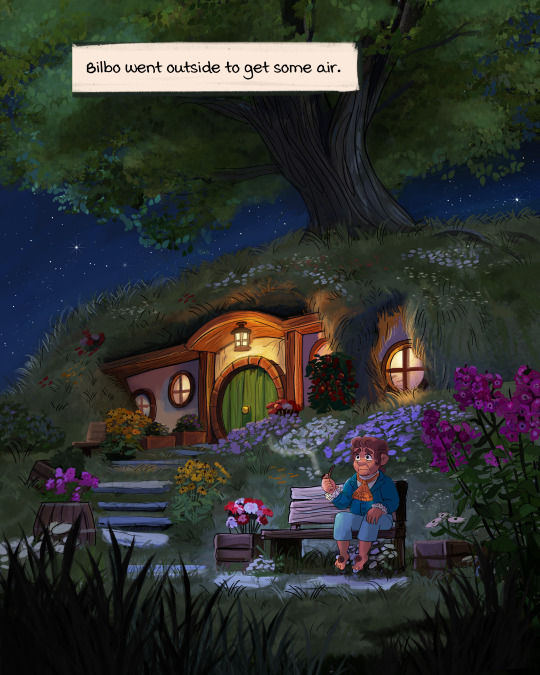
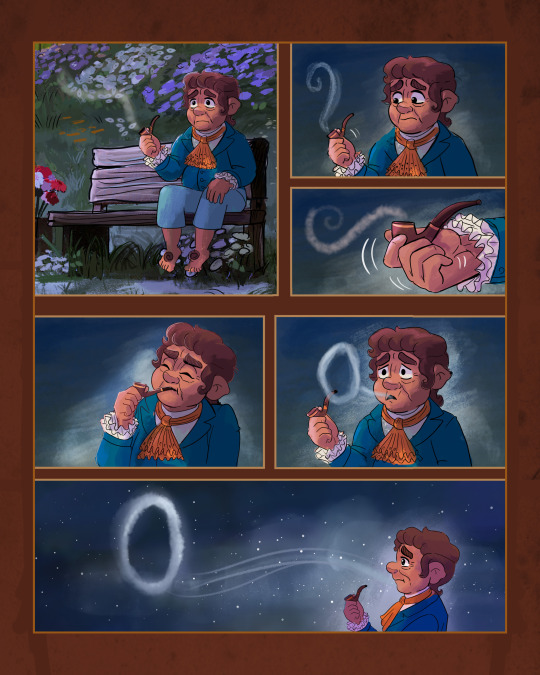
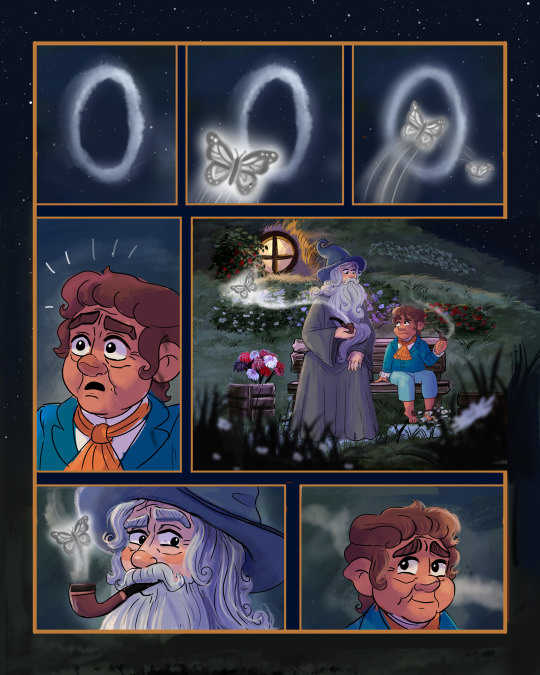
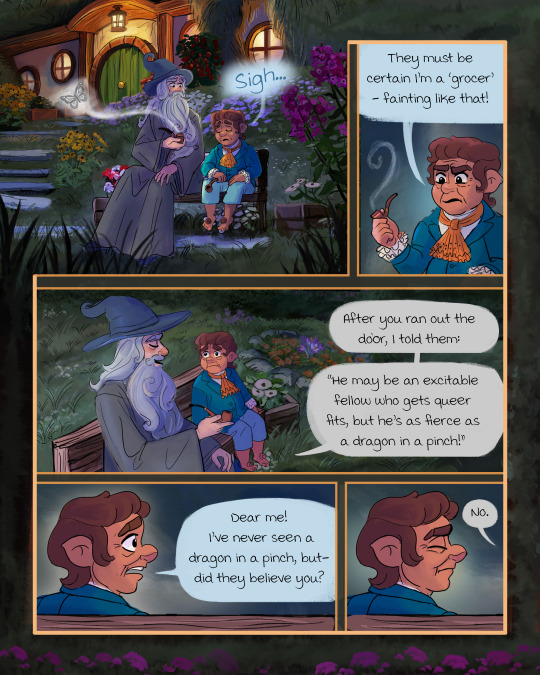
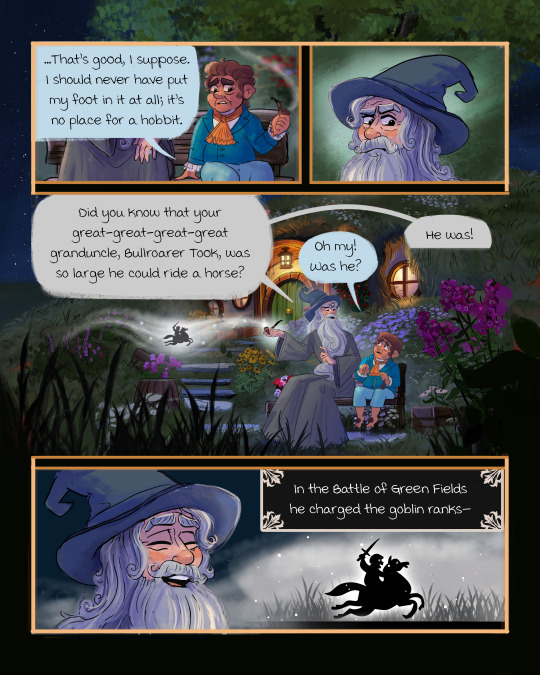
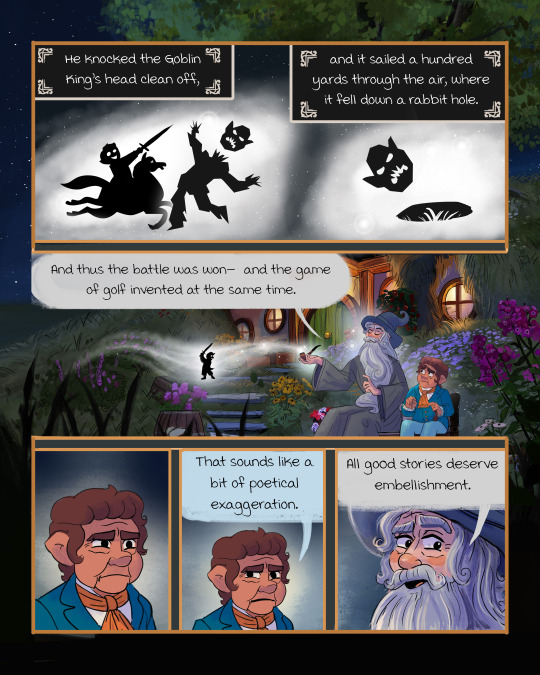
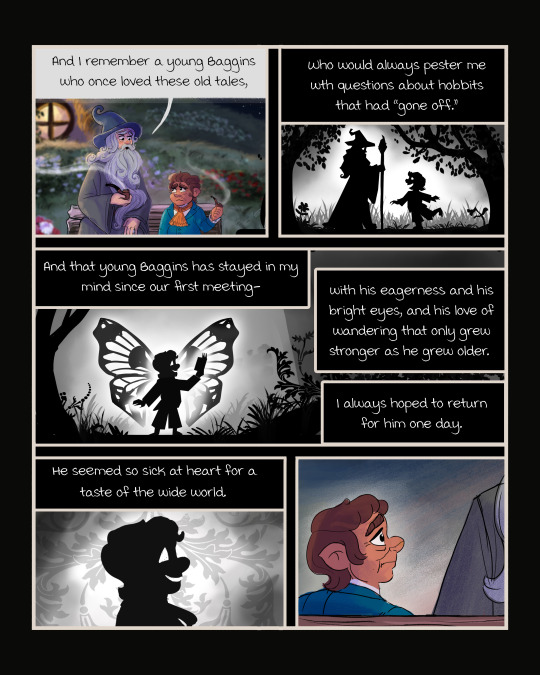
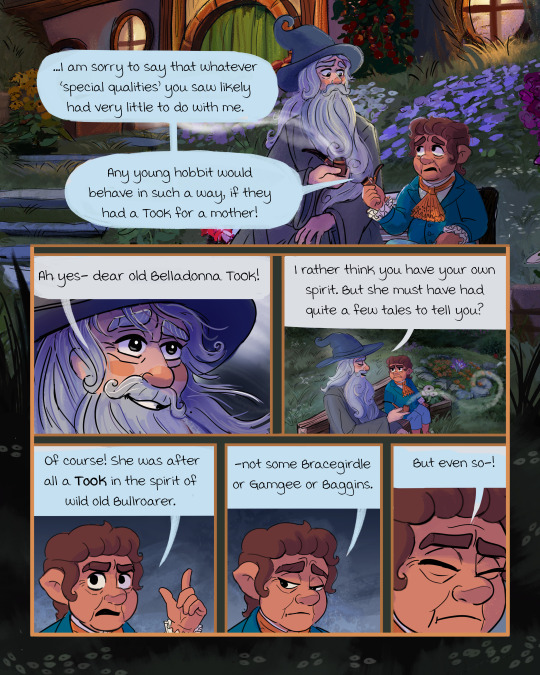
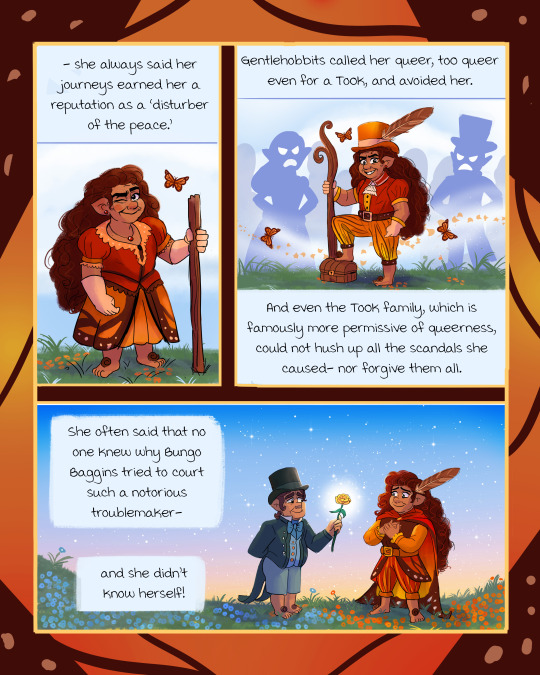
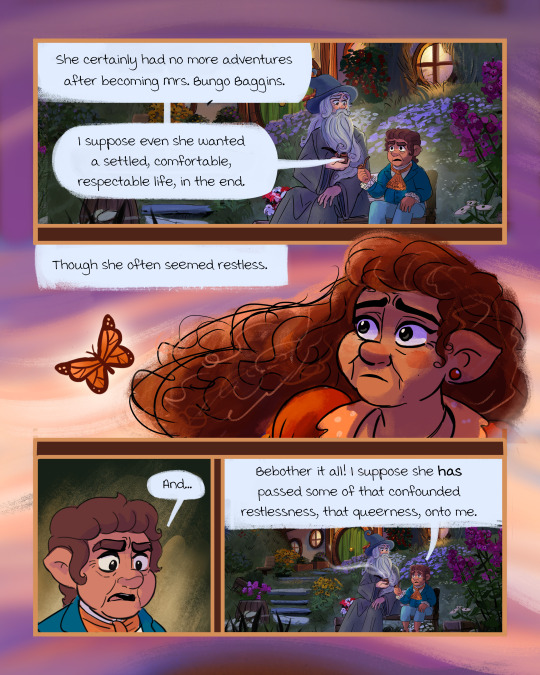
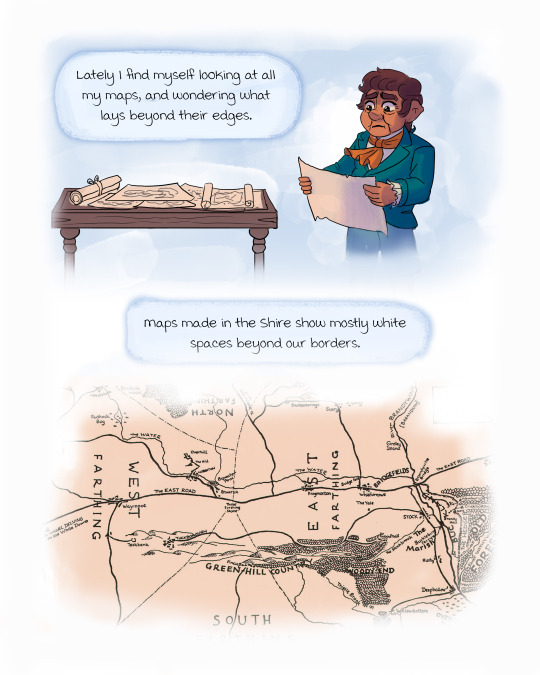
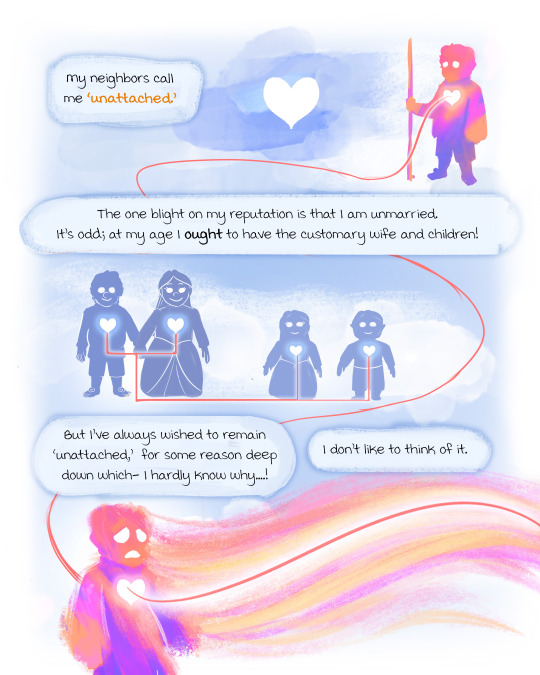
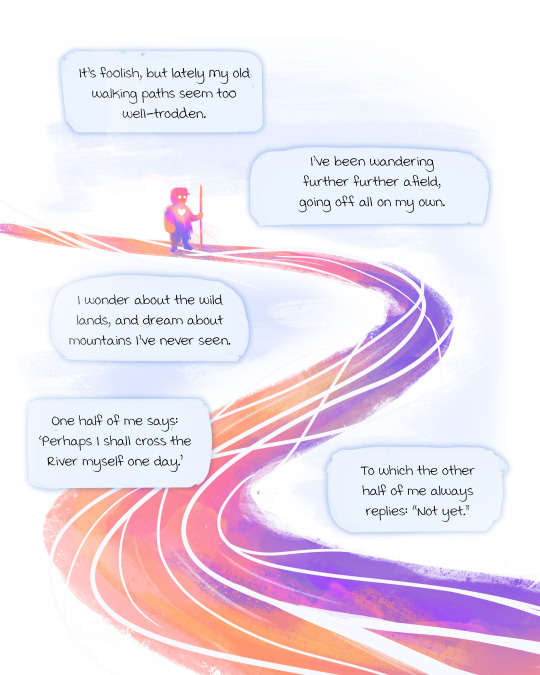
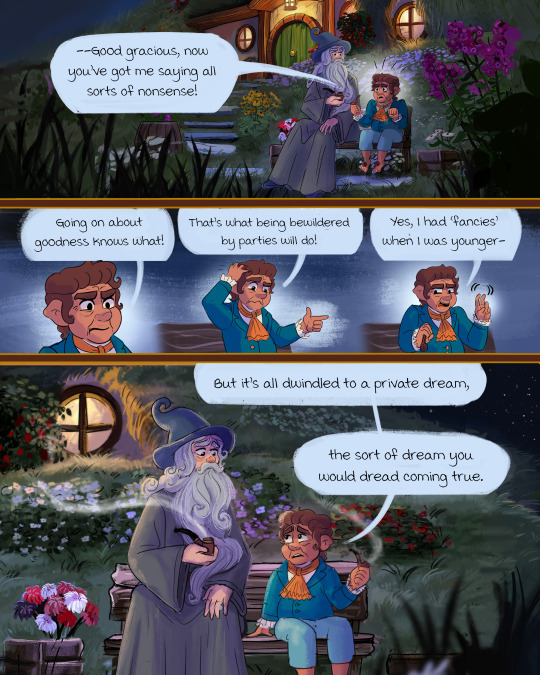
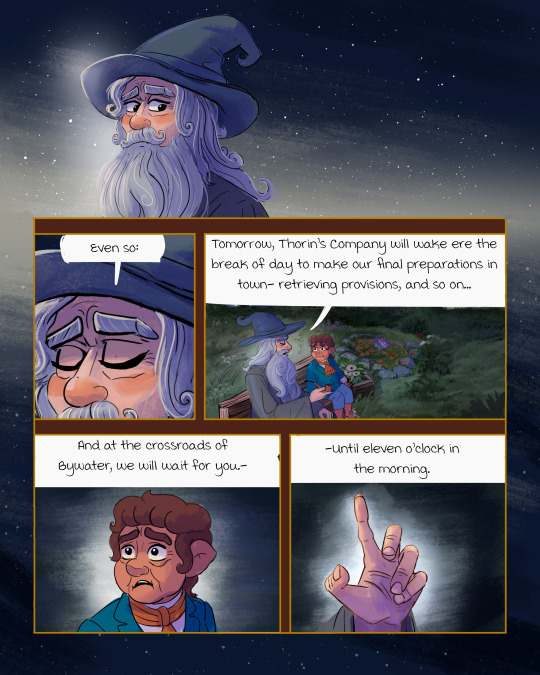
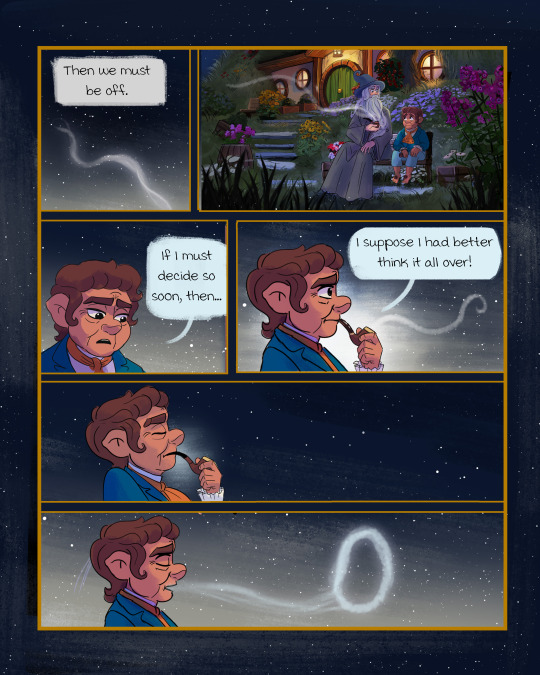
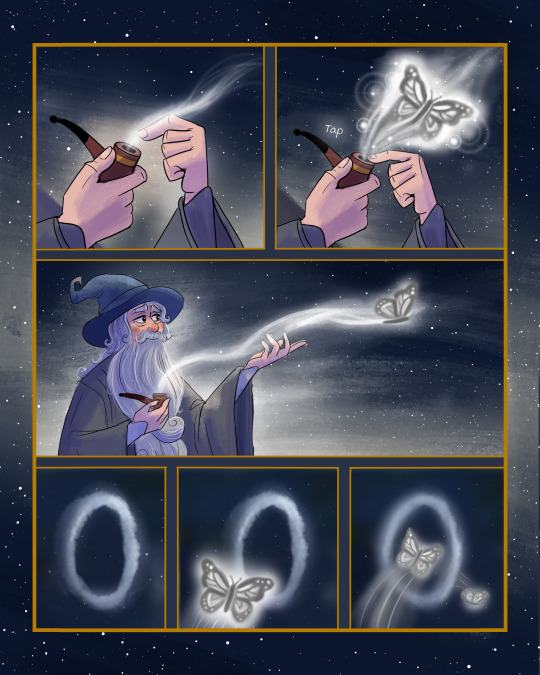
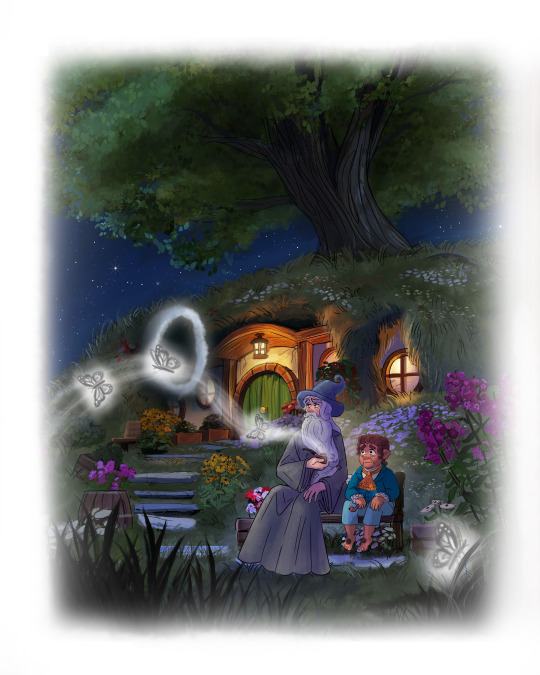
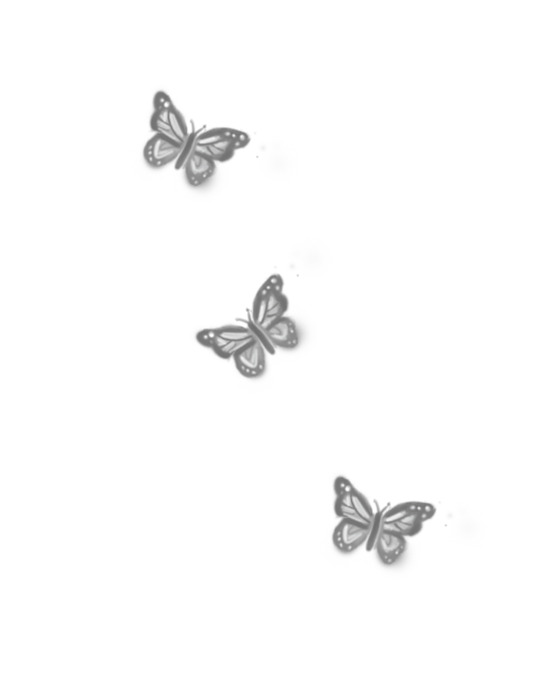
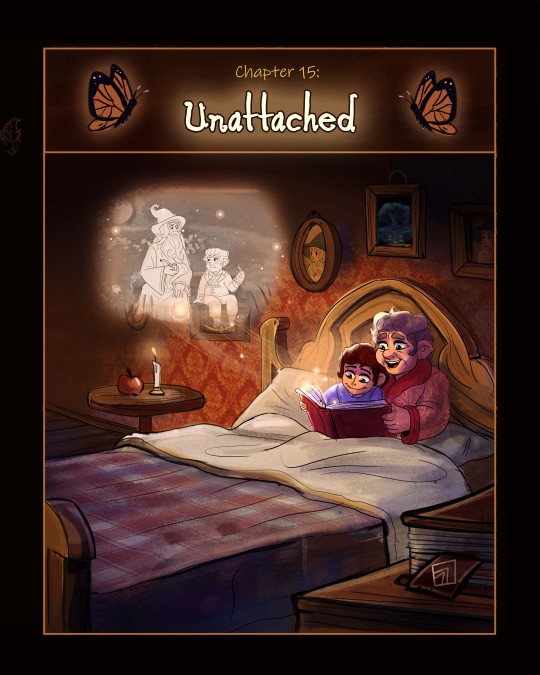
Retelling The Hobbit Chapter 15: Unattached
First chapter / Previous / Next
Read full comic on: Webtoon/A03
Other blogs : Instagram/Tumblr Sideblog
Thank you for reading! The next chapter of this comic adaptation of The Hobbit will be titled (drumroll)....The Song of the Lonely Mountain!
Check under the cut for notes on the callbacks to previous chapters of this comic, and to Tolkien stories like the Unfinished Tales!
—-
—-
One of my guiding ideas for this comic is that the story is being written/drawn by Bilbo Baggins, an “unreliable narrator,” who has a biased way of recounting events. As the comic goes on, parts of the story get retold through new perspectives (or through the eyes of other characters), and you realize the initial version you read was incomplete.
A lot of you probably noticed that this chapter features a ton of callbacks to the earliest chapters of this comic! We saw child Bilbo and Gandalf's friendship told from Bilbo's POV in Chapter 3.....but in this chapter we see it retold from Gandalf's POV.
However, Belladonna Took is our biggest instance of that! Not to overexplain my own writing, but Chapter 1 is an older Bilbo painting an idealized happily-ever-after fairytale picture of Belladonna, while Chapter 15 features a younger Bilbo telling a far less optimistic version of her life. While there's truth to both of them, neither of them is the full truth.
In the Fellowship of the Ring, Bilbo tells Frodo that ‘books need to have good endings,' like endings where everyone "lives happily ever after." If I were to continue this comic to the end of the novel, Bilbo’s habit of “rewriting things to be happier" would become a whole Thing.
Second: Much of this chapter is taken directly from “The Unfinished Tales: The Quest For Erebor.” That story was Tolkien’s attempt to unite the tone of The Hobbit with LOTR, by having Gandalf explain what The Hobbit looked like from *his* perspective. The gay line about Bilbo feeling incapable of settling down into a Traditional Marriage with a Wife And Kids is taken almost directly from the Unfinished Tales. So are all the lines where Gandalf reflects on what Bilbo was like as a child, and the moment where Bilbo reflects that all of his desire for adventure has dwindled to a private dream.
Third: Obviously, the other big influence on this chapter (outside the original novel) was a similar scene in the PJ film. The little bit where Gandalf reveals the lore behind Bullroarer took monologue is the only dialogue I’ve directly lifted from that scene. ;3
Fourth: some of you may have caught that I used a quote describing Frodo’s wanderlust in the Fellowship of the Ring to describe Bilbo. The bit describing "the maps that only show white spaces beyond their borders" is also why I emphasized Bilbo’s canonical nerdiness around maps in earlier chapters (chapter 5 especially, but also in Chapter 6, Chapter 7, and a blink-and-you-miss-it moment in chapter 14.)
Fifth: one of my favorite things in the original book are all the scenes where Gandalf does fun Whimsical things with smoke/smoke rings. In the book he usually makes them change color or race around; in my comic he usually makes them turn into butterflies (he also does this in chapters 3 and 11.) you may have noticed that Butterfly Symbolism is a big thing in this comic. But yeah, in another callback: Gandalf finally had time to blow smoke-rings with Bilbo, which he said he 'had no time for' in Chapter 2!
Thanks again for reading! I tentatively plan for the next chapter to arrive on November 13th.
#the hobbit#lotr#lord of the rings#the hobbit comic#retelling the hobbit#chapter 15#bilbo baggins#belladonna took#gandalf the grey#YEEEEEEEEEEEET#anyways#thanks again for reading!!!#long post
841 notes
·
View notes
Text
The Maiden and the Drowning Boy | Aegon x OC | Chapter Eleven
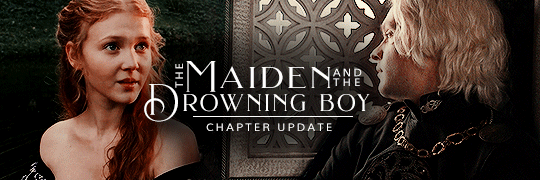
Rating: Explicit
Ships: Aegon II Targaryen x Abrogail Strong (Lyonel Strong's Daughter), Jacaerys Velaryon x Helaena Targaryen
Summary: As the kingdom teeters on the edge of chaos, Alicent Hightower swaps the pieces on the board: Aegon will marry Abrogail Strong, Larys’ younger sister and heir to Harrenhal. Caught in the web of intrigue and political machinations, the pair must figure out where their loyalties lie, and what they mean to one another.
Tropes: Childhood Sweethearts/Friends to Lovers, Generational Trauma and Cycles of Abuse, It's All About the Character Development, Unreliable Narrators, Multi-POV, Canon Divergent, Bisexual Aegon II Targaryen, Book/Show Mash Up, Fix-It Of Sorts, Stopping the Cycle of Abuse before it gets us all killed, Team Neutral, fairy tale vibes meets victorian medievalism meets grrm
no tag list. please follow @emkald-fic and turn on post notifications for updates or subscribe on AO3
Tumblr Masterpost
Chapter One | Chapter Two | Chapter Three | Chapter Four | Chapter Five | Chapter Six | Chapter Seven | Chapter Eight | Chapter Nine | Chapter Ten
AO3 Link
Translations:
hāedus - younger sister
Bratsios - bitch
lēkȳs - older brother
Muñus - mother
ñuhus trēsys - my son
zēapos - little jadeling
Warnings: Aegon's suicidal ideation

CHAPTER ELEVEN - Whose Side Are You On
A maiden finds her claws. A drowning boy swims for the surface.
Curiosity was an excited animal inside of Lady Abrogail Strong, and it had taken every ounce of self restraint she had honed in her whole life not to immediately launch into the years of questions and ideas that had built inside of her.
She deserved praise for such restraint, and she knew none would come, but it didn’t keep her from wanting to crow about how good she thought she’d done. Abby had barely touched the meal, absently dropping her extra cold meats onto Aegon’s plate if only to get through it faster. Not even her betrothed’s clear hangover and the scent of sweat and cheap perfume clinging to his wrinkled clothing could bother her. She wouldn’t let it.
No, he would not ruin her morning with his terrible decisions and she wouldn’t dwell on it either.
“Lord Ryam will be here in a fortnight and wishes to discuss the amphora shipments,” Uncle Simon said, his brogue rumbling through him thicker than her father’s accent had been, but so heartbreakingly familiar in its ebb and flow. “It might prove a good opportunity to start getting settled, Your Grace.”
Aegon shoved a rolled piece of ham in his mouth, elbows on the table and eyes darkly circled and red rimmed. “Amphoras?” he asked through a mouthful of food. Abby raised an eyebrow at him before blowing gently on her cup of mint tea and taking a sip so she wouldn’t fling it at him.
“I would also like to take the opportunity to reach out to House Buckler. Lady Elinor came with the Baratheon retinue and she shall likely be coming with us,” Abby said quickly before Aegon could further embarrass himself. She smoothed her hands over the table. “While the Arbor is a purveyor of wines, I would like to look at bolstering the competition. I think it could be an interesting opportunity for us.”
Larys slathered cream upon his bread. “You will find my sister has fancied herself the Lady of Harrenhal for as long as she found words,” he said softly, his voice carrying over them in even tones. Abby’s ears pricked with heat. His words may have been encouraging, but there was a tone in his voice that made her feel like a child who had done something clever. Mockingly indulgent. “You will find yourself a very astute student, eager to learn. Isn’t that right, dear sister?”
“I only wanted to be helpful.” True to his word, they had begun having a weekly supper together, going over Uncle Simon’s latest reports on the running of their holding and that of Harrentown. It hadn’t given her much insight into the inner workings of her elder brother’s mind, but she had appreciated the education he was providing.
Now she felt the curl of doubt that Larys was so good at coaxing out of her. Aegon’s eyes were on her and she resolutely didn’t meet his gaze, instead taking another sip of her tea.
“Well that explains the rather detailed letter I received,” Uncle Simon chuckled, and it was fond. “The queries you both had were rather insightful. It is good to see you are also interested in learning to rule, your Grace.”
Aegon paused in chewing, and Abby felt the heat creep into her cheeks. She had stated in her letter that the questions had been from them both, and had framed it as a joint venture, wanting to put the best foot forward for Aegon, for them both.
“You’ll have to forgive me, Uncle,” Aegon said, voice rough from his clearly exciting night prior. She took a sip of her tea, some of the tension in her chest easing at the way he took to her Uncle so familiarly, speaking as if they were family already. “I do not quite remember all that I had asked sweet Abrogail to convey. I do know she wasn’t sure whether or not to put in the thoughts on aqueducts.”
That drew Abby’s gaze to him, but Aegon was cracking open his soft boiled egg and soaking pieces of bread in the sunny yellow yolk. She was hit with the recollection of how excited she’d been finding out about aqueducts in a dusty tome in the library. She’d dragged it all the way outside, trapping Aegon in her sudden lecture of how beneficial such things would be.
He remembered it.
“Th-that’s true! Aqueducts!” She said, finding her voice and her confidence once more. “My more immediate concern was, well… let me just go and show you.” She pushed away from the table and hurried into her bedroom that had now seen more use in the past weeks than it had in years. She came back with a haphazard folio of parchment and two larger rolls, setting them down on a side table. She took one of the large rolls, furrowing her brow. “Uncle Simon, could you hold this end for me, if you please. Ah, thank you. So I’ve been working on this for quite some time. Athair assisted with more logistical questions with the completion of the renovations and rebuilding of the hall. Harrenhal is simply too big for a simple seat. The stables can house two thousand horses, and is unfeasible. So with the sept needing to be rebuilt, and the repairs that…” she paused, the memories catching her off guard and pressing onto her with the weight of them, “that needed to be done after the fire, I thought that perhaps what would be better suited was opening it to the people.”
“The people?” Uncle Simon’s brow raised in curiosity. He didn’t seem quite as surprised as she had initially worried.
“Yes! I thought we could dismantle the right barracks by the godswood, and install the glassworks properly. In addition, the Tower of Dread - I haven’t figured what we should rename some of these towers, they really are awful - can be renovated into apartments or, if we could figure something out, to build shops and homes and places of education for those in Harrentown and truly, in the area around. Maidenpool, High Heart, even places further north. Not only that, but the everyday workings of Harrenhal do not require such expansive forges. We aren’t building an army. We could open them up to something more communal. Those who cannot afford to open their own smithies yet could work here, perhaps renting space. Of course, we need several of these for the reconstruction efforts, but I truly think we should focus on repurposing rather than to bring it up to the hubris-driven monument of cruelty that Harren the Black created. We can turn what was a curse upon our lands to something that gives back.”
Abby was breathless when she was finished, the parchment crinkling in her grip. The fire crackled merrily in the hearth, and Larys avoided looking at her to take a furtive bite out of his tansy cake. Uncle Simon’s eyebrows were raised so high, Abby thought they’d merge into his receding hairline.
She did not look at Aegon. She very purposely did not look at him, but from the corner of her eyes, she could see him occupied with his goblet.
“Well.” Uncle Simon broke the silence and picked up some of the parchment she had left on the table. The sheafs of paper were currently in danger of the potential tipped honey jar. “Your father did not exaggerate when he spoke of your insightfulness, niece.” Warmth spread between her ribs at the praise. “The exuberance is all your mother’s. That woman could command an army as easily as a summer ball.”
The comment stunned Abby. It had been years since someone had so easily spoken of her mother. Abby’s own memories were hazy. The smudged images she still held were of a frail woman with a warm smile and gentle voice. She could remember cold hands smoothing over her hot brow when she was ill. Visions of her mother sitting beside Queen Alicent, soothing her in those early days of bloody, picked fingers, flitted through her mind. The early days of seeing how sad the adults were, how angry they could be. The blissful ignorance in not understanding why.
“I shall look these over, Abrogail. Whatever ideas you and Prince Aegon would like to implement, I am at your command and will provide my counsel, just as I counsel Larys, and have your dear father.” Uncle SImon gave a hearty laugh and plucked up some of his cold meat. “How strange it shall be to have family in residence once more.”
The rest of the morning meal was uneventful, and Abby was caught in the strange current of nerves and excitement and the lingering uncertainty of how she felt about the mention of her mother.
“Celeste Strong could command an army as easily as a summer ball.”
Abby could not recall a time hearing her mother raise her voice the way the queen did, or Uncle Otto. Never did she recollect her mother raising a hand either. No, her few memories were warm and gentle comforts, but she could remember quiet conversations between her mother and the queen, when her mother’s blue eyes had been narrowed, and mouth pinched in displeasure. Abby remembered wondering why the queen was being scolded as a child once, how fierce her mother’s face had been.
Her father had been capable of yelling, and that was incredibly rare. The last time she’d heard him raise his voice was at Harwin after everything that had happened at Driftmark. They hadn’t realized she’d been there. The Strong household had never been a yelling household. It had never been a place she’d ever feared.
“We have dinner with the Tullys in the small hall,” Aegon said, his snappish tone pulling Abby from her thoughts. She looked over her shoulder to see that he’d followed her from the apartments. “Try not to throw yourself at Elmo Tully as you did with Vance at the feast.”
Abby’s eyes widened, mouth dropping open at the sheer audacity of what dared come from his mouth. “I beg your pardon, Prince Aegon. I seemed to have been distracted and therefore could not have possibly heard the accusation against my honor.”
He rolled his bloodshot eyes, and Abby’s firsts clenched in her pale blue skirts. Heat flamed in her cheeks, and there was a mad moment where she ached to push him over the railing into the court below.
“You do beg so prettily-”
She stepped towards him, pushing her finger into his chest. “And you’ll never hear me beg for you again, especially if you dare continue to speak to me this way,” Abby hissed. She would not cry, she refused to show him how he hurt her. “Your loss, clearly, since you are threatened so by their mere proximity, and my daring to smile and harmlessly flirt.” She scoffed and tossed her hair over her shoulder, her curls wild to keep the chill from off the back of her neck. “I’m not the embarrassing one who showed their face this morning drunk and smelling like a brothel.” She cursed the way her voice cracked at the end, and turned on her heel to go find Wylla, to distract herself with those who would support her, and not be the target of their self-loathing.
There was a time not so long ago, where she might have taken full responsibility for Aegon’s foul mood, but she was no longer that little girl, a somewhat steelier young woman taking her place, one who understood that she was not responsible for the entire weight of other’s emotions, including Aegon’s. Abby was sorry for the cruel words she had said, the words that she knew would hurt. She was truly sorry for it, but Aegon had no right in how he continued to behave toward her in his own river of whatever self-loathing he was trying to drown himself in.
He didn’t get to use her to weigh himself down into the depths.
Abby only made it a few steps before Aegon’s large hand wrapped around her bicep in a firm grip. Her hand came up immediately, nails digging into the skin, and there was an almost pleased look on his face, a darkening of his gaze, that sent a tumult of conflicted feelings in her. Anger at not being taken seriously. Curiosity at why he seemed to find it pleasurable. The desire to scratch and claw at him until she drew red.
Her spine went rigid, a swooping sensation rolling through her belly. A rush of anger was expected, the strange thrill that accompanied it was less so. "Let go of me, Aegon."
He leaned in closer, his lip curling and his white teeth flashing in his snarl. His eyes, however, lilac and blood red from his previous night, seemed rounded, panicked somehow. "No." Aegon's gaze fell to her mouth, and she swallowed, feeling heat along her throat. She couldn't figure out if it was from anger or embarrassment and it only served to incense her further.
They were so close and she wanted to kiss him, to feel the slide of his warm mouth against hers, taste the lingering watered wine on his tongue. She wanted to bite him until he bled, to taste the crimson that would well up, and let it make her dizzy and forget everything else.
She would have kicked him if the angle was right. She would have scratched at his wrist had they been alone. If the thought hadn’t been so abhorrent, she might have slapped him.
Try as the queen might to make it true, Abby was not Alicent Hightower.
“Aegon,” she whispered, steely eyed and spine stiff. “You’re hurting me.”
His grip immediately released as if he’d been scalded, and she was sent stumbling back from the abruptness of it. Aegon’s mouth opened, shut, clenched with whatever conflict was going through him.
“Touch me like that in anger again, and it won’t be the ghost of my dearest brother you’d need to fear. I’ll geld you myself.” Wylla would gladly help her and hide the evidence. The murderous eyes that she held for the prince since the feast would have incinerated Aegon on the spot if Wylla had the power.
“Since when have you become so violent? Was your sweet and forgiving nature also a deception? A game to make me-“
Aegon fell silent, soft cheeks flushed and the silence was full and rolling with the years between them, all of the weight that brought them here. Abby was flushed with hurt that had her snapping and spitting in a way she never knew she was capable of, in a way she’d never allowed herself to feel, let alone show.
It felt good. It felt good in the way sobbing in Helaena and Wylla’s arms had done. She felt… brave.
Her mother had shown it. Celeste Strong had been more than the smiling wraith of her childhood memories, even though she had never witnessed it.
‘My mother was a lioness of Castamere. Do I not share that legacy as well?’
“I play no games, Prince Aegon.” He was not my prince right now. Her prince, her Aegon, would not treat her so. Yet, here Aegon was, doing exactly that. Behavior she had seen extended towards others had finally reached her. She thought of the list of qualities the queen found wanting in her son and her own immediate defense and her vow that she was not blind.
She had hurt Aegon, it was true, but he’d taken it and run, wielding his pain like a warhammer. It was a wound he had not expected from her. Had she truly expected him to act differently? Had she expected him to look past her words to see the pain she was in? ‘Yes,’ she thought, and he should have, but why had she chosen to hurt him instead of asking for comfort? Why had she not confided in him?
‘Am I truly so stupid and naive? Is the Queen right?’
In turn, he had expected perfection. Pretty and pliant. To comfort him as she always had. Her head ached with the confusion of all the questions.
“Did you know he got a child on one of my maids? I gave her moon tea and gold and sent her away.”
“Do not take my sweet and forgiving nature for weakness,” she hissed. Abby was the type to cry when angry, but her eyes remained mercifully clear. “I care for you, but you do not get to treat me as a toy - as a plaything that only exists for you.”
That had Aegon stepping forward and back into her space. “You’re mine, Abrogail Strong. You’ve always been mine.” The words stole the breath from her and her mouth went dry at his vow, his lilac gaze black and bloodshot, edged with a possessive desperation that was unlike what she’d seen from him before. So confusing were the warring sensations inside of her as he spoke them into being.
Abby wanted to bite him when he said those words, and the strength of the feeling frightened her with its intensity. She wanted to bite him and leave an imprint of her mouth on his skin. Where, she did not know. She wanted to tear into him with an unrecognizable drive that confused her.
Abby swallowed as the tip of his tongue touched his lower lip in that way of his.
“Let me be the only one you touch this way.”
She thought of his face wet against the crook of her neck, her fingers stroking through his hair, the curls she’d cut gathered at their feet. She thought of the way she rested her head on his shoulder, and he promised she would never go away, that he would keep her safe as she lit mourning candles in the wake of the fire.
“You’re mine, Abby,” he repeated into existence. “You’re my betrothed and you fawn all over that Vance welp one moment, and tell me you care for me the next. What is it to be?”
“I was being polite!” She only half-lied.
“You did it to make me jealous!”
“And? How do you think I feel when you show up this morning smelling like a brothel and still half drunk? How do you think I feel seeing you dance with Lady Cassandra, let alone ogling her so openly.” How desperately she wanted him to look at her that way. “If I’m so unequivocally yours, then why does it only go one way, you selfish, cruel man? Do I not get to call you mine?” Aegon drew back at her words and Abby did as well, gulping in air that didn’t taste of him. Enough distance created between them that Abby could not feel him. “I wish I could say how sorry I am to disabuse you and your mother of this notion that I am the Maiden. I’m not, and…” Her voice halted, and the flushed heat beneath her skin was suffocating and prickling, robbing her of words.
“And I’m full of vice as they come,” Aegon said as if finishing her sentence, his voice hollow and glimmering eyes that did not meet hers. “No amount of tender touch and soft words can change that.”
A fleeting twist of guilt coiled through her at his tone and she thought of Alicent Hightower’s insistence that she was meant to cure whatever was broken and wrong with Aegon. She was not the Maiden or some holy miracle, but neither was Aegon broken and irredeemable either.
“I suppose that makes us…that makes us ourselves then.” It felt strange to say, it felt strange to feel those words and to even hear them.
“Yes,” Aegon rasped. Abby’s eyes were hot, and Aegon’s were wet.
The moment stretched between them, a gulf rushing with water, soaking into her skirts and threatening to drag her under.
Abby took a deep breath as if preparing to dive into the Blackwater itself, to dive into the rush between them. Instead she turned, gathering her skirts in hand and walked away, forcing herself to look ahead to shore when half of her wanted to be pulled under with him.

The clash of steel on steel echoed through the training yard and Aegon spun his left sword, the right one connected and sliding against Harrion Karstark’s greatsword. Sweat dripped into Aegon’s eyes and Harrion himself was flush with exertion. Not even the gathered crowd around them nor the gaggle of ladies above could draw his attention.
They didn’t matter. He already had thrown up his breakfast after the first bout so whatever humiliation left for him was negligible.
Aegon sprang back and brought his dual swords down and across himself, trapping Harrion’s blade between them. He met the man’s eyes, and the northerner gave him a twitch of a grin and an approving nod of his head.
“Watch me. Ignore the distractions,” Harrion had said when Aegon stormed into the training yard half an hour earlier. Aemond was the one who took his anger out on the squires and Cole and whomever else unfortunate enough to get in his way. Normally, Aegon would have fled to Sunfyre and the sky above, but it would take too long to reach him and the space between Aegon’s ribs craved blood.
Preferably his own.
If he flew in that moment, Aegon could not promise he’d come back. Whatever that would look like.
Aegon wondered if Harrion’s blade had some strange northern magic that could carve the rot out of him that flame could not burn and cleanse away. Mayhaps he was more Hightower than Targaryen. Mayhaps that’s why he was like this.
Harrion’s swing knocked Aegon’s right blade from his grip, sending it skittering across the gravel. The larger man was on him, pressing Aegon back with great swings and the force of blocking him vibrated painfully in his arms.
"You are a million miles away, Your Grace," Harrion said, still circling him, his blue eyes discerning far more than Aegon appreciated. "That's how you end up with a blade through your shoulder. Trust me, I know."
Aegon ignored him, grinding his teeth.
"You could tell me what was bothering you, perhaps. At the least it would provide me with more of a challenge that… whatever it is we're doing now."
“We’re not talking about her,” Aegon grunted, swinging his blade out and moving around the larger man. “It. We’re not talking about it.”
“I’ve heard say that a good swordsman doesn’t let himself get distracted by such things, so that answers that.” Harrion’s mouth twitched up as he winked and Aegon felt a surge rumble through him. With a shout, he darted behind the training dummy and kicked it violently towards Harrion, buying himself enough time to go for his thrown blade.
“Begone!” Aegon commanded with thunderous force in his voice at the crowd, sending several bystanders stumbling back in surprise.
Aegon’s blades met Harrion’s with his teeth gritted and forced him back.
“Well, now we’re getting somewhere. Red hair? One breath away from dissolving into tears.” Aegon swore he saw judgement on Karstark’s face but the elder man simply rotated his greatsword in hand. “Don’t tell me you stepped on her feet while you were making a spectacle of yourselves.” He didn’t see the shoulder check coming and Aegon went stumbling back, nearly falling on his ass had he not come up against the weapons rack. “See? Better than a blade in the shoulder.”
A growl tore from Aegon’s throat and he swung his blades, causing the taller man to jump back out of the way. “You stick a blade in my shoulder, it’s treason.”
Harrion looked unsuitably unimpressed. If anything, Aegon swore he saw another twitch on his mouth and the greatsword was coming at him again, sliding along his left arm and leaving a white hot sting that had Aegon hissing and looking at the cut of his padded tunic and the bright slash of red along his bicep.
"Well," Harrion said with a shake of his head. "Shame. So what happened?"
Aegon looked incredulously from his arm to Harrion’s face, a weird sense of satisfaction emanating from the sharp sting of the slice on his arm. It lacked the brute force of a punch to the face and with the pain, he felt an unknotting sensation in his chest.
“I... don’t fucking know,” he said with feeling, swinging his left blade to meet Harrion’s with a clang. “I don’t fucking know what she wants from me when she never asked for anything different!”
The blades slid against each other, coming back again and again with the bright sound of steel clanging and Aegon wondered if Valyrian steel would sing differently in his hands.
“The thing about women is that they expect you to pay attention,” Harrion said, turning so Aegon’s swing missed and he turned the greatsword over his head and brought it down again in a move reminiscent of Harwin Strong and came down and would’ve taken Aegon’s head off had he not managed to black it in time. “You’re not great at that, are you?”
“How in the seven hells am I supposed to pay attention when she doesn’t fucking say anything!” he yelled, frustration tearing out of him with the force of dragon flame. “She’s always accepted me, she’s always been there for me, stood by me, she knows who the fuck I am and never said or asked for me to change. And now she thinks that since we’re going to be married I’m not what? Going to flirt and fuck and drink and be whatever…” He was choking on spit and something tangy and metallic in his mouth. “Whatever the fuck is wrong with me.”
There was a slap of metal against his chest and he looked down at the flat of Harrion’s blade pressed against his chest. “You missed,” Aegon said, tilting his chin up with a long look. “Neck’s here.”
“You’re pathetic, Your Grace.”
Aegon blinked. “What did you just say?”
Harrion lowered his blade and drew it along the end of his tunic, not looking at him, completely unbothered that Aegon could have lost his temper again and swung his blades at him. “I said, you’re pathetic. What kind of man are you, what kind of prince of the realm are you? You’re to be married and become lord to one of the largest keeps in the realm, and yet here you stand, a soft bellied boy, fretting over the idea that the lady you’re engaged to might not like your behavior.”
There was a rushing in his ears and Aegon opened his mouth to retort, to snap that Harrion Karstark, heir to a little backwater hovel, couldn’t speak to him like that, just as his sister didn’t have a right to do so.
“She’s been twisting herself in nervous circles preparing for this outing,” Wylla had hissed at him, the most courteous smile on her face but her fists clenched at her sides like she was about to fight him herself. He had stood beside his horse, resolutely ignoring the confused hurt on Abby’s face when he’d directed her to the carriage before they headed out into the city to attend the guild festival all those weeks ago. “So you are going to stop being a petulant, mercurial child and act like you are the luckiest man in the seven kingdoms to have her waiting for you.”
“She said we were lucky to like one another,” he finally rasped out, his palms sweaty around the grips of his blades. “That it’s more than what most can say.”
“She’s right, you are lucky, and revelations abound for you, Your Grace, because you’re so lucky and you do like one another, she expects you to afford, oh, I don’t know what it’s called, mayhaps respect?” Harrion’s gaze had lost the amusement and was now flat and cold as ice. “That girl is a prize that you’ve been given. I’ve seen that in the short time I’ve known her. And it seems you can’t grow up and be the man that she deserves. How would you feel if she went and fucked one of those other lords fawning over her, and then said ‘well, you didn’t ask me to change’.”
It must have been the hangover. Aegon was sure of it. The longer he stared at Harrion Karstark, the more he swore he saw Harwin Strong standing there, speaking conversationally to him after catching Aegon hacking one of the training dummies to death with his new blade.
He blinked again and it was Harrion once more, far closer now than he’d been on the other side of the training ring. Aegon hated how much taller the man was, how small he felt beneath his cold, stormy eyed gaze. Harrion gripped his shoulder in his large hand and Aegon swayed beneath it.
This would normally have been the point where his mother would snarl at him, “Do you have nothing to say for yourself?”, but Harrion? He said nothing except look down at him, waiting.
"I'm marrying a woman I've never laid eyes on when I head back north. Never met her, never heard the sound of her voice. I've written to her, tried to learn what I could of her through her own words. You though? You should probably pull your head out of the dragon shit and stop treating your situation as I would wager you treat everything else." He paused, then added, “Your Grace.”

“It’s growing late, my prince,” Erryk said with a disapproving look that Aegon didn’t give two shits about as he rubbed his hand over Kostōba’s golden cream neck, scratching his fingers along the line of his mane. “Are you sure you want to go out now?”
“Cargyll, when have I ever decided against going out this late?” It wasn’t as if it was late. The sun was a molten line on the horizon, the stars beginning to show along the eastern horizon. Night was better for him.
How ironic that he rode the sun. How ironic that the one he…
His thoughts were interrupted by another horse whickering, a dappled grey stallion with a braided white mane. Helaena sat astride him, her silver hair braided back, her riding leathers blue scaled leather with silver edging. Arryk Cargyll was coming up on his own horse, his Kingsguard armor gleaming in the evening light.
“Well, come on then. Aren’t we going flying?” she asked, eyes languid, voice expectant.
“No!” Aegon started, glaring at Arryk who was allowing his sister to think she could just ride out. “It’s not safe for you out there this late.”
“Oh, but it is for you when you avoid Ser Erryk every night?”
“Ser Erryk doesn’t make for good fucking company,” Aegon snapped. “Go back inside, Helaena.”
Helaena looked at him and then softly commanded her stallion to head out towards the gate. Kostōba snorted and whinnied softly, pawing at the ground and bumped his head into Aegon’s shoulder. He pet the horse’s neck gently, murmuring soft words to him before he gripped the saddle and hauled himself up. “Fine. Come on. If you’re lucky, you won’t even have to wait for us.”
They just wouldn’t come back. Maybe he’d talk Helaena into it.
The ride through the city was mercifully uneventful. Aegon kept beside his sister, glaring down at any lurking in the shadows that might come towards her. Helaena didn’t seem bothered by it, smiling at those who waved, their cries of ‘Princess Helaena!’ endearing in a way Aegon would not admit he was jealous of. He could see the tension in her shoulders at being noticed, and the way they relaxed once they went through the outer gates of the dragon pit.
Sunfyre was already out, chirping and chortling in his concerned way where he kept dipping his head trying to get closer, ruffled and annoyed at the dragonkeepers who kept him from rushing forward.
Aegon and Sunfyre set off first, and he looked down below as Dreamfyre’s great, blue bulk was led out into the yard. She was at least twice the size of Sunfyre, all pale blue scales and silver markings that twinkled like starlight. They circled languidly, and Aegon felt the chill of the air caress his cheeks and leech the heat from him, and for a moment, he swore he could feel Abby’s fingers cool across his brow, asking him if he was alright.
To watch Dreamfyre launch herself into the sky was a sight to behold. She wasn’t whip fast the way Sunfyre was, she didn’t lumber like Vhaegar. She took off, smooth as silk, flowing through the air like a fish swam through the sea. Her wings were great things, pale blue membranes veined with more of the silver markings that covered her great form. Aegon would never admit it, but Dreamfyre might have been more beautiful than Sunfyre when she took off into the twilight gleam, melting into the streaks of the swiftly darkening sky.
Helaena’s laughter echoed across King’s Landing, louder and brighter, Aegon swore, than the bells of the city itself. There was no need to give command to Sunfyre. He looked towards the south and Sunfyre let out his low call and took off, racing ahead towards the looming dark of the Kingswood.
Riding with Sunfyre was like flying through the sky himself. He leaned over the horn of the saddle, gloved hands outreached to press against his neck and together they moved, one being and one thought. No command passed Aegon’s lips. He simply felt his desire to run, to fly and flee until they could outrun all that plagued him. Away from old River Lords, and the storms of the North embodied in wolves with blades and teeth, away from the brokenhearted look in a pair of eyes as blue and endless as the ocean.
It wasn’t long before the pair of them circled the cliffs at the edge of the Kingswood, Sunfyre fluttering down as light as a leaf on a pond. Dreamfyre landed not long after and Helaena waited for him, perched like a little blue beetle on the rocks and looking out over the great gorge.
His sister watched him in her inscrutable way and Aegon stood some distance from her, unsure if he wanted to go to her, for he didn’t know what it was he wanted. Aegon’s gaze drifted over his shoulder to the cliff edge, the breeze tugging his hair across his face. He could simply just-
“Aegon.”
Lilac eyes snapped back to look at his sister and he kicked his foot against the ground, pawing at it like his horse before he came over and settled beside her. She said nothing, only reached over to take his left hand in both of hers to hold in her lap. His shoulders sagged beneath the leather of his jacket, his fingers twitching in hers.
“Sunfyre would be upset if you did,” she said and Aegon rolled his eyes.
“Sunfyre would get over it.”
“You’ve always been a terrible liar.” Helaena’s voice remained soft and calm and he scoffed lightly, a half hearted smirk playing on his face.
“I’m quite a good liar. You should play me at cards.” Levity amidst the depths that he was sinking in. Water and dirt or fire and blood flooding his mouth and ears and weeds and rock weighing him down.
The sounds of the forest were alive around them, the gentle song of crickets, the distant rustles of night time animals coming out of their daytime slumber. Aegon fiddled with a stone and chucked it out over the cliff edge and imagined it spinning out into the night sky to knock one of the lofty stars from their perch. Would Abby want him if he brought her back a fallen star?
“I told Aemond I wasn’t going to marry him.”
Aegon raised his eyebrows at her. “Huh.” An elegant response but there was a headache pulsing behind his eyes and he was at a loss for anything substantial. “How long has… how long have you been sitting on that revelation?”
A soft shrug, her fingers sliding across the rock towards a little lizard that had previously been sunning itself. “Some days I thought I could. Some days I wanted to marry him. I liked the way he looked at me, kissed me, desired me. Other times, I missed him. Who he was before Vhaegar.”
“Who he was before those bastards attacked him,” Aegon snarled, tossing another rock over the edge of the cliff. Helaena’s hand still held his and she squeezed his fingers, a gesture he instinctively returned back. His stomach lurched with nausea thinking about Ser Harrold carrying his bleeding, screaming brother into the throne room of Driftmark. They held his mouth open to pour milk of the poppy down his gullet to ease the pain.
‘Where was Ser Criston’, Aegon remembered thinking. Where had the guards been to find that Aemond had never gone to bed? Where had the guards been to see a loud, squabbling bunch of children on their way to what? Dragons couldn’t be stolen. Jace and Baela knew that, should have known that.
“We should have been better,” Helaena whispered and Aegon looked over at her. She was watching the little lizard crawl over her hand, the thing curling beneath her sleeve with the little head poking out as it sought out her warmth. “You should not have teased him so.”
A hot flush of shame and anger washed through him and he jerked his hand out of his sister’s hold. “Īlon kydȳbagon. Beqes? Iā valonqār īlvrot idīnnoso pirtrirzi zoklākore?.” Let us measure. A pig? Or falsely enticing our brother with marriage?
“Se qringaomnot dijāvē qrimbughere, marta issa?” Helaena countered. And is that the same as drowning in your vice and lust? The words clawed at the meat of him. Her eyes bore into him as hot as dragonfire and Aegon pushed away from the rocks and scuffed his feet in the dirt, putting distance between them so she could not see him so easily, perceiving his rot and ruin.
“She didn’t even care, so why should he?” Aegon snarled. Rhaenyra hadn’t cared about her brother, her blood, just an insult as if the whole fight had been Aemond calling them bastards, not the whole of them attacking Aemond and he needing to defend himself.
“Would you like to go riding?” his sister asked him softly, a gentle smile on her face. Her belly was starting to round with her own child, and mother was in her room, pacing with her own child to come. Aegon clutched his dragon to his chest, looking up at her uncertainty. He wasn’t meant to be alone with Rhaera, his little mouth struggling with the syllables of her name. The idea of riding up in the sky, on a real dragon rather than a toy in the nursery, excited him and he nodded, reaching and taking her hand and giggling with surprise when she scooped him up, the way mama said he was too big for.
“She didn’t even care,” Aegon repeated, his harsh voice a rasp in his throat, betrayal and hurt that he hadn’t felt in some time coursing through him.
The cliff edge was so utterly appealing.
“Dragons of flesh weave dragons of thread,” Helaena’s voice drifted softly on the evening breeze. He chewed on his lip and looked over his shoulder back at her. She was fixated on the lizard along her hand and lowered it, allowing the little thing to flee into the cracks among the rocks.
Aegon pushed the hair out of his eyes and turned then. “Are you alright?”
“Yes.” It was simple, matter of fact, and she palmed her knees, the leather creaking with the movement. “He’s not, but…” Aegon was quiet, ignoring the call of the void, and focused on the way his sister’s hair gleamed in the fading light. In another life, they would be married, in the way their Valyrian blood demanded and every day, Aegon was grateful that they had both escaped the fate. He loved his sister, but couldn’t imagine doing what would have been required. He couldn’t imagine touching her, instinctively recoiling at the thought. Helaena was beautiful, Aegon would readily agree on that. Buxom and beautiful, with eyes that could stare into your soul and a smile that was warm as firelight.
“But?” he asked when her gaze grew distant. She shook her head.
“I think he felt as confused as I did. But you know Aemond. Once he has his mind set on something…” She tucked a loose strand of hair back from her face and drew her legs up to rest her feet against the rocks. “I told Mother. I suppose this means Aemond will go to Storm’s End.”
The sight of Cassandra’s mouth on his cock flashed across his vision and he thought of what that woman would do if she got her hands on his brother. Aemond was intimidating, Aegon was loath to admit it unless it was to his advantage, and women either were drawn to it or repelled. But he was still a green boy, inexperienced despite Aegon’s attempts to get him with the best the Street of Silk had to offer. Cassandra could very well tear him apart if Aemond wasn’t careful.
“Well he can have his pick out of the four, although I think that little hyperactive deer would be the best choice.” It would be several years until the child would be old enough to wed, which might appeal to his disinterested brother.
“Floris is going to fell a stag next Storm Festival. She shot a bullseye and everything.” Helaena’s tone was fond and lighter than it had been before. “I’ve claimed her, by the way. You’ll be taking Cassandra Baratheon with you. Hope her tits fit in the carriage.”
Aegon snorted, laughter bursting from him in surprise. “My my, hāedus, are you jealous of her fantastic tits. If you need reassurance, you do have some of the better breasts I’ve only passively looked over.”
“You called her tits fantastic, and mine ‘some of the better’,” Helaena said airily, and Aegon let out another snort of laughter. “It’s fine. I’ll forgive you. You have been a bit messier than usual. Ever since the feast.”
His laughter trailed off, and while his sister had elevated his mood, it wasn’t enough to erase away the tangle of vines that had woven their way through his ribs, constricting like the venomous snakes of Yi Ti. “Mmmm, have you been sending your many creatures to spy on me?”
“No,” Helaena replied. “But I spent the whole night comforting a hysterical Abrogail Strong in my chambers afterwards. I’ve never seen her cry so hard, let alone cry in general. Dear girl doesn’t like to show that side of herself.” She shook her head. “Not to mention you looked like Mother had forbidden you from riding Sunfyre before the feast started and I heard Ser Erryk talking about pulling you from a brothel and dragging you back to the keep slung over the ass of his horse.
“Well, when you put it that way.” Aegon shook his head and kicked at a stone, sending it dancing across the ground. He felt sick to his stomach at the idea that he’d sent Abby into hysterics after the feast, and there was little convincing himself that it was everything else that had upset her, when she had upset him so much.
When it was more than just her that had upset him, and he’d taken it out on her.
“She wants to geld you. Well, no. She said were her dearest departed brother still alive, he’d gift her your balls on a platter.”
“Oh, no, she threatened to geld me herself this morning.” Helaena giggled and Aegon flushed. “I showed up to break our fast hungover and smelling of perfume. That was embarrassing for her. Apparently.”
“I would be embarrassed if my betrothed showed up to eat with kin smelling of other women.” Helaena’s voice was in that easy way of hers, no judgement and matter of fact. When he met her eyes though, they flashed in the dark, a fire burning in her lavender gaze. “Aegon, you’re an idiot.”
“Thank you,” he said with a roll of his eyes. “You’ll be pleased to know this isn’t the first time today I’ve been called as such. Lucky for me, you don’t have a sword.”
“Yes, but I do have a dragon.” As if on cue, Dreamfyre rumbled from where she was sitting nearby, an antler hooked on her mouth from her meal she’d just finished. Aegon made a face. “Harrion Karstark is handsome though. I wouldn’t mind it if-”
“Please don’t finish that sentence,” Aegon cut in sharply. “Besides, he’s rather devout to the bride he hasn’t met yet. Riverlands girl.”
“Right. Riverlands girl. Not dissimilar to your own, I’d wager.”
“And what, pray tell, are you getting at? If you wish to lecture me, then do so.”
“I don’t need to lecture you, Aegon, but I do have a question.” Aegon gave her a blank look, stealing himself for whatever it was that Helaena was about to throw in his face. “Why do you think Abby hasn’t come asking to have the betrothal broken after all of this?” He opened his mouth, and shut it with a click, a shake of his head. “You’re an idiot,” she repeated.
“She’s nice! She does whatever Mother fucking tells her to do. She’s such a proud little member of her household, doing everything she can to fucking be her.” Helaena made a little face in response, but didn’t argue and Aegon tugged at the clasps on his riding jacket, shrugging out of the leather and letting the breeze cool his too hot skin.
“Do you like it when she’s like Mother?” Helaena asked curiously and Aegon flushed.
“I like it when she’s bossy. Not my fault it sounds like-” He snapped his mouth shut as his sister let out an indelicate snort, snickering from her spot. “Bratsios,” he swore at her, which only caused Helaena to let out another snort. “Fine! Fine I’m a fucking idiot. Happy?” He threw out his arms and gave a little spin for dramatic effect. “I don’t know what the hell I’m doing, She went into this whole thing about why the tables only go one way, and that at the end of the day, we’re just ourselves and she walked away and I think she wants to break this whole thing off-”
“She’s not,” Helaena cut in with another soft chuckle and leaned back against the rocks, tilting her head back to gaze up at the sky. “And she may sound like Mother sometimes, but she’s not. She’s not Mother.”
“She’s not the Maiden,” Aegon finished, the memory of Abby’s eyes, large and wet and flashing with anger and hurt seared on the back of his own eyelids. “She’s not… She’s just… Abby.” He felt his shoulders droop, the tension that had knotted through him for the past few days released, albeit slowly. “She’s just Abby with her needlework and her cat and her drawings and all her books.” He felt his mouth twitch. “She had a whole presentation this morning, did she tell you? I’ve never seen her handle so many scrolls, going in about all the changes she wants to make to Harrenhal for the people and she had pages of sums and she was talking about fucking trade agreements with some house and her whole face was lit up and she was talking too fast and I swear I thought she’d faint from forgetting to breathe.”
He looked down at his hands and from beneath the edge of his cuff, three half healed lines from where she’d scratched him bloody were still visible. Aegon instinctively brought his wrist to his mouth, sucking on the healing skin that still held the faint tang of copper. “When she lets herself, she’s full of fire and passion. She’s biting and vicious.” His hunītsos so sweet and soft but teeth that would bite when a hand threatened. “What did I do that made her so angry with me to begin with?”
His sister shrugged. “Maybe you should ask her before it’s too late.”
“What’s that supposed to mean?” His voice was sharp and focused on Helaena’s impenetrable gaze. “Helaena.”
���She was rather pleased on a walk with Ser Edmund the other day in the garden,” his sister finally said. “She’d left the picnic and ran into him. They were quite close together when Floris and I found them, all blushing and shy.”
Aegon’s stomach plummeted and his hands tingled, cold dread and hot fury rushing through him. Whatever look was on his face had his sister jumping up and closing the distance to grab at his arms.
Sunfyre growled nearby, Dreamfyre answering with a short, sharp huff of annoyance.
“You’re an idiot, but do you understand why she hasn’t gone to break this off yet? Because she cares for you. You’ve been pulling her away from the rest of us for years. Mittys iksā, Aegon.” You are a fool. He tried to jerk his arms from her, but Helaena held fast to him. “You are, and I resent you for it often. Aemond resents you for it, hoarding her as you try to do, but what you don’t see, lēkȳs, is that she allows you to do it. Had she not wanted you in return, Abby would not allow you to get away with it as you do.”
Had she not wanted him in return.
‘I never wanted you.’
Abby had never spoken those words though. Even the memory of it in his head didn’t sound like her. It sounded suspiciously like his mother, like his excuse for a sire, even Cole but… but never Abby.
In his grandfather’s office, Abby’s hand had been trembling in her lap before she reached for him, the smile tremulous and panic in her eyes. Not fear. Not disgust. She had reached for him, and he had reached for her when the world felt like it was breaking apart beneath their feet.
“And yet she flirts with that pompous cunt,” Aegon snarled and Sunfyre responded in kind with another growl that had Dreamfyre reaching out a clawed foot to push at his snout.
“So what? You flirt all the time and don’t you dare say it’s any different. The only difference that lays between you two is that you often go to paw and prod and fuck those you flirt with. She doesn’t.”
The idea of Abby doing more with one of her rare flirtations had the coil of anger firing inside of him once more as he thought of what he’d done with Cassandra Baratheon, with Marla Lefford after the feast.
“And? How do you think I feel when you show up this morning smelling like a brothel and still half drunk? How do you think I feel seeing you dance with Lady Cassandra, let alone ogling her so openly? If I’m so unequivocally yours, then why does it only go one way, you selfish, cruel boy?”
Protests died on Aegon’s tongue and he staggered back, feeling sick and dizzy, feeling angry and brokenhearted. Confused and uncertain, and yet entirely certain all at the same time. Helaena’s hands drifted back but she didn’t move away from him, didn’t tear at him, and certainly didn’t take advantage of the moment to push him over the cliff’s edge.
“I tried to be good for her,” he rasped.
“Did you truly? Or were you simply doing what it is you always do, and thinking it would work this time?” Helaena asked.
Aegon gave her a wary look. “When did you become such an insightful one, heltusītsos?” It had been years since he’d called her little beetle, the nickname coined by Aemond. Helaena startled at the words, her head ducking down and averting her gaze.
“You all try to baby me and I’m sick of it,” Helaena muttered, pushing him without any real force behind it. The wind kicked up, whipping at her moonlit braid and tugging tendrils of hair across her round features. Sometimes it was like staring into a mirror, the pair of them with the same round features and their mother’s large eyes. “So I’m endeavoring to speak my mind and tell you how I feel and when I think you’re all being foolish, which is quite often, you know.”
Jealousy and anger continued to roil in the pit of Aegon’s gut in the silence that followed his sister’s declaration. The idea of another man’s hands on Abby, his fingers in her hair, on her skin, of someone else making her laugh - that was Aegon’s laughter that was stolen. He always did what he could to make her laugh, to draw the bright sound from her so she would forget how sad she was, how lonely. How she giggled in his arms when she kissed him, when he kissed her. Her shrieks of laughter when he’d defend her in children’s games, their hands grabbing each other as he tugged her to the safety of his camp away from Jacaerys and Lucerys in the gardens and in the woods.
The soft sound of pain when he grabbed her cut through the memory. ‘Had she learned to quiet them as he had?’
Her eyes, so endlessly blue as the ocean itself, shining with tears that he’d caused.
Aegon just wanted to make her laugh and smile, instead of shutting down as she had after her father and Harwin’s death, when it looked as if she would simply blow away as dust. The memory of a small girl, eyes perpetually red and cheeks chapped with endless, silent tears looking so small in the sept before the Stranger. The way she’d looked at him when he approached and how her hands had fisted into his sleeves and she sobbed into his shoulder.
He remembered telling her the story of Ser Harwin slipping in the mud when they were in the stables and swearing Aegon to silence with a laugh. He told her of the time Mother had lost her wits at a giant Dornish spider getting loose in the cloisters and how Lord Lyonel had come, speaking calmly and rattling off all these interesting facts about it with a box in hand and how Mother lost her mind to just kill the cursed thing!
‘I could never hate you, Aegon.’
Did she truly mean it?
“What if I’ve just fucked it up beyond repair? What if we’re just doomed to be fucking miserable?” Aegon’s voice was small, his eyes wide and frightened in a way he hadn’t felt in a long time, not since he was young and the first time the Tower had kicked him and nearly crashed his head in, lashing him with such cruel words that had Aegon stunned and spinning.
Helaena shrugged. “What if you haven’t?”
Hope unfurled, a frightened animal in his chest that wasn’t sure if it was safe, long boxed away and his breath hitched, an uncertain smile crossing his face.

Jace leaned against the carved stone of the shallow balcony outside his room. The sun had set and the moon was rising, the deepening blue of the sky beginning to glitter and twinkle with so many stars.
His thumb rubbed over the ridges of the long dead little sea creature embedded in the stone he held, lavender eyes hooded in thought. His room felt bare this night, his belongings loaded into trunks and taken down to the ship earlier in the day. Shelves that had been bursting with books and maps, with trinkets and baubles now gone and packed carefully away. Jace suspected that Luke had made off with some of the more coveted items he’d been sneaking off with, like the history of the Vale of Arryn that he’d been particularly interested in as of late.
A knock on the door drew his attention and for a moment, Jace thought about not answering, pretending he was tucked in bed and fast asleep. The heavy door creaked open and he let out an exasperated sigh. “Mother-”
“I know, you’d like me to wait before barging in,” his mother said. She was dressed for an evening of relaxation - a loose, scarlet robe with woven and knotted clasps over her nightgown, her hair braided back from her face and slung over her shoulder. The Princess rubbed her hands together and her gaze flitted over the bare spots across the room. “Well, you are six and ten. The gods know there are things I do not want to walk in on.”
Jace felt his cheeks flush, a sputter escaping him. “Muñus-” He would not think about the last time that had nearly happened, rolling off the side of the bed and being convinced he’d broken… things.
“I know.” She looked beautiful in the candlelight, her pale skin flushed golden in the flickering candlelight around his room. “Indulge me, zēapos. I only have a few hours left to tease you.” She stood beside him, gazing out at the Narrow Sea. Her warm hand reached up to stroke through his hair, dark brown curls wild and tugging free along his face and shoulders. Jace was struck by how strange it was to finally be taller than his mother, who loomed large over him for as long as he could remember, a beacon of home and warmth. He slung his arm around her shoulder and ducked his head at the kiss she pressed against his cheek.
The Valyrian flowed from him as it did his mother. Since he began his lessons in earnest, most conversations took place in their ancestral tongue. “I promise to keep Baela out of trouble.” His sister was coming with him, having raged for near a fortnight at being sent away when she had only just returned from Driftmark with Rhaena. Daemon had raged back, their voices echoing off the stone of the citadel whenever they were in the same room until Luke had declared he was moving into the caves with Arrax until they stopped.
His mother chuckled. “Oh, neither of us will hold you to that. Baela is like her parents, clever and wily. But you two will have one another to rely on, as well as your grandfather. You are second in line for the throne, ñuhus trēsys.” Jace turned and she took his face in her hands, tilting his head down to rest his forehead against hers. “No matter what anyone says, or insinuates, you are my son, my heir. You will sit the Iron Throne, you are not just a prince of the realm, se dārilaros iksan.”
“Nyke dārilaros iksan,” he repeated.
I am the prince.
Her smile was gentle and soft, her eyes crinkling at the corners and she pushed up on her toes to press a kiss between his brows. “I’m so proud of you for doing this. Do not let them forget that you are a dragon. You ride Vermax, and only a dragon can bond with a dragon.”
“I miss him,” Jace whispered before he could draw the words back. His mother’s hands trembled against his face. As he knew she would, she drew back and her hands dropped to his shoulders, smoothing his loose shirt.
“Laenor was a good man and he would be proud of you.” There was honesty in her words, but Jace could not say that Laenor wasn’t who he had meant. It had been another man, who had been unwavering by his mother’s side, who had been there for everything, that Jace referred to.
But that was treason and not even he could speak it.
Jace sucked it up and he gave a short nod. “He would.” His father had been good to him and his brothers, even if he wasn’t always there, often with Ser Qarl and other men at Driftmark. He was never cruel, always kind and encouraging upon his visits, even with the distance between them that never felt lonely, not with his mother there, not with Ser Harwin.
How lucky he was, to be loved as he was. To have so many who cared for him.
How frightening it was, to go to a place that had once been his home, and now full of those who loathed him.
Jace rubbed his thumb against the stone he held and he watched his mother’s hand join his. “What’s this?”
“I found it a few days ago, when Vermax and I went to the other side of the island.” The curled seashell had long turned to rock, broken in half over time so the inside ridges were visible. “Don’t know what it is. It just…” Another shrug. “Called to me, I suppose.”
“It must mean good fortune on your journey, then,” his mother said and pressed a kiss to his cheek. “Now, my brooding boy, get some rest. You have a long journey ahead of you, and your men will be looking to you to not be half asleep slumped over a pile of rope.”
Right. He needed to be alert and present. He needed to be seen, he needed to participate, and work side by side with the sailors on their journey. Prove himself to be one of them. Prove himself more than the rumors that chased them from King’s Landing. Rumors that flashed bright as dragonfire in his step-grandmother’s gaze in the flickering great hall of Driftmark.
[Chapter Twelve]
#fic: the maiden and the drowning boy#aegon ii targaryen#aegon ii targaryen fic#aegon ii targaryen fanfic#aegon targaryen#aegon x oc#aegon ii targaryen x oc#hotd#hotd fic#hotd fanfic#house strong#aegon x abby#my fics
14 notes
·
View notes
Text
Percy Jackson Fandom: The Lack of Perspective in the Fandom
I love the Percy Jackson series, I love it so much but, sometimes the fandom frustrates me. Particularly, the lack of diverse perspective and opinions in the fandom. All of the "hot takes" I've seen from others are luke warm at best or just showing that they didn't make the effort to understand the series at worse.
Whenever I see posts talking about how different situations would be portrayed from another characters perspective, the posts are shunned and the OPs are harassed. Mind you, if you haven't seen this, that's cool but, I'm talking about what I've seen. You could mention how a perspective flip could change the tone of a scenario and suddenly you're public enemy number one. That's what I mean when I say there's a lack in diverse perspective.
A lot of people seem to forget we can actively try to see the story through another character's perspective to empathize with them and their experience. It causes the fandom to lose a lot of understanding of different characters and their actions and the situations I noticed this are typically whenever Percy does something that could have had a negative impact on another character and everyone just ignores it.
That or when somebody tried to shed light on why a character may have been negatively impacted by his actions, it's typically filled with hate comments. Now I love Percy just as much as the next person but, let's all be real here - he can cause negative impacts to other people even if it's not intentional.
Let's all say it together: Percy Jackson can negatively impact other characters without malicious intent.
I feel like we seem to forget we see everything in the Percy Jackson and the Olympians series from Percy's perspective only. Meaning it has his bias. He's not what I'd call an unreliable narrator but, he is a character with his own opinions of people.
So wouldn't it be more interesting to try and look at PJO through another character's perspective? Annabeth's? Grover's? Nico's? So many other characters to try to imagine the perspective of.
Imagine how Percy inadvertently hurt Annabeth because she thought he died? (Battle of the Labyrinth) He didn't know what would happen so yeah, it's not his fault but, she had to of been really upset.
Imagine how Grover must've felt when Percy ditched him in the first book? He had to of been so anxiety ridden due to the fact he was positive Percy was a half blood. Percy didn't know about this but, he still inadvertently caused Grover a probable anxiety attack.
Last but, not least imagine how traumatizing it was for Nico when his crush was choking him? (The Last Olympian) Percy was trying to defend himself, yes, but could you imagine how traumatizing that was? I could write an entire post for this in itself. I have a lot of very strong opinions about this scene particularly and Percy and Nico's whole entire allyship(?) in the Last Olympian.
These are all times where Percy didn't mean any harm but, most likely caused a lot of harm. And they're all at different points in the series. As I said before, I love Percy but, a lot of people cannot handle when people point out how his actions towards other in the series affect other characters. I'd love for us to look at the stories or parts of the stories that are told from his perspective from other characters' points of view.
Perspective can alter and change an entire story and characters and it's frustrating that I don't see people playing around with character perspective.
#pjo/hoo#percy jackson#percy jackon and the olympians#just a thought#creative fic prompt??#annabeth chase#grover underwood#nico di angelo
22 notes
·
View notes
Note
Personally I don't see what you see in Geordo. He seems like such a scumbag to me and is the least likable charater in the whole series. He is always trying to get her alone to push her into things of a sexual/ more romantic nature without taking how she really feels into consideration. Like he "really wants her" and thats enough for him without caring what she really wants. Honestly he is the borderline non-con villian in my mind.
I mean, it's okay if you feel like that. To each their own.
Hmmm when I think about Geordo being sexually aggressive towards Katarina, I only really just think of the anime. The manga is a much more moe-fied and toned down version of the novels, and the novels does an okay job at balancing his desires for Katarina in all aspects. I'm not saying he doesn't have that trait in the other two mediums, I just think that they aren't as intense as the anime, so as someone who consumes all three versions I just tilt my head and go "huh." Of course I'm sure there are people who read the manga and novels that still feel uncomfortable about his behavior and that's valid too.
-> light novel spoilers ahead <-
tldr, there is a lot more going on to him than just someone who offers sweet words and questionable invitations to Katarina's ears, this may not be noticeable or acceptable to some people but we get to know more about how he thinks whenever the novels puts us in his point of view. You're free to dislike him as much as you want, but I like him & don't see him as a scumbag; and here's why:
I at least find it okay that Geordo is very serious about his pursuits for her because he is aware that she is dense and will not get it until you spell it in the sky. Everyone is just walking eggshells around Katarina hoping that the girl would just develop feelings for one of them to win the harem olympics. He knows that being dealt with a good card isn't enough, so he's actively taking action in order to win her heart. I mean I don't always agree with his methods either, like the "fait accompli" line or constantly inviting her to his room alone, but really, how much of that is something he really means to do vs how much of that is his excessive flirting + our minds assuming that he really means to claim her in that way?
Lines like that are really popular with japanese fans because it makes Geordo look "sexy" and "forward", which they enjoy in their fictional stories. He knows that his position gives him an advantage so he'll try to play his cards right and use it to increase his chances in victory.
It actually reminds me of a scene from the Hamefura StoryMe game, (don't really know how canon it is but I remember the JP ver. was advertised by @/hamhura) where Geordo indirectly asked Katarina how to woo a girl he really likes, and Katarina thinking he was referring to Maria, gives all the things he usually does in order to win her heart (visit her home, give her gift, dance with her in parties, be really forward about your feelings etc). I'm not saying Katarina approves of the ways Geordo attempts to win her heart, but there's some hilarity in knowing that Geordo already had and is constantly trying all the known ways to win over a girl in the world from a young age, and still has nothing to show for it. Like no awareness, much less any *feelings* lmao. So trying to make it obvious that he is interested in her romantically and sexually seems like the next logical step to him. I mean if you go by Geordo's logic and considering the time period this takes place in, he's pretty confident that he can get Katarina to love him back and they are engaged anyways so in his head he's in safe waters to attempt to make teases about such advancements if it gives him the smallest chance that Katarina would become at least aware of him through it.
Of course I know that stuff like that won't fly here in the real world, but maybe that's why I'm so lenient personally when it comes to his (debatably) sexual teases and advances, because it's a fictional story for a japanese audience. Doesn't mean I would approve any advances like that if it happens to me, it's just that it's hard to take his actions seriously when Katarina or the story doesn't take them seriously. Like, the girl would be pushed down to a bed by RufuSora and gives her a hickey and she still thinks the man is out for her blood.
He wouldn't even be entirely wrong, knowing the identities of the characters who Katarina knows has romantic interest in her in the novels, actions does speak louder than words when it comes to her. Like I said, whether or not Geordo really means what he says when the story teases the readers with sexual implications in his words and action depends on the reader in my opinion. They are there, I wont pretend they don't but I'd argue about the level of intent depending on what scene you're talking about.
The only scenes on the top of my head where he is very abrasive towards Katarina is the "fait accompli" scene, the Book scene form the anime (S1 EP8), saying he wants to lock her in his room (LN6) and the multiple times Geordo had invited her in his room at night alone (LN6 and LN8, i think).
I've already explained why I am okay with both Keith and Geordo's Book scenes from episode 8 of the first season because they are accurate representations of an exaggerated and unhinged versions of their desires towards Katarina so I won't bore you with those details again.
He mentioned in Volume 6 that he wants to lock Katarina in his room forever and keep her light to himself, which alarmed a few people when the book came out, but he said that in a moment where he feels super grateful and loving towards her because she knew how tired he was despite his fake face and without even saying anything. It was a moment where he felt so infatuated towards her that he wished the moment where he gets to rest in her arms would last forever, thus he made such a comment. I make it sound more dramatic than it was in Volume 6, it was just a quick comment honestly lmao.
For people who don't read the novels, that last part looks very sus and raises a few red flags I know, but to be fair we can't definitively say what his intentions are because Katarina never commits to those visits. Katarina has actually become wary of those invitations, because Keith and Mary have warned her that Geordo's intentions are sexual, but I'm not really trusting the word of the two people who are most distrustful and antagonistic to Geordo. They could be right, of course, but who can really say? We assume that they are correct because they care about Katarina and are wary of Geordo, but hamefura('s novels) is full of unreliable narrators anyways, it's not like Keith or Mary would consider the possibility of it being anything else because when it comes to the third prince they always fear the worst case scenario.
If you think about it, Geordo is probably aware that winning her over with a "fait accompli" won't work at all because it'll put him in a position that will make other people push him for the throne (which he doesn't want) or could ruin his reputation in high society if Katarina or her family react to it negatively. I'm not Geordo though, so I can't really say if he even have such fears and doubts in the first place, that's just my assessment based on the obstacles he has. On the outside he is really sure of himself and confident (which he arguably deserves) and on the inside he is very careful and insecure when it comes to Katarina.
Also like, spoilers but for someone who is very forward when it comes to his physical advances, Geordo is super weak when he is in the receiving end of those touches. He gets super embarrassed and easily flustered when its Katarina who is touching him, as if implying that to some extent that he's all just talk lmao.
I don't really agree that Geordo doesn't care about what Katarina feels at all, in fact his inner dilemma in the novels is that he doesn't know what to do because in every step he takes he might do something that could ruin his image in Katarina's eyes, be it pursuing or abandoning the throne or looking like a monster in front of her. He even halts his plans to make advances towards her during the Keith Kidnapping Arc, but threw it away because he knows how much finding Keith means to Katarina. He puts what Katarina want and doesn't want as his priority, so when what she feels is unclear that's when he acts on his own intuition. The only reason Geordo feels so confident to advance towards her sexually is because Katarina never rejected him before (because she doesn't know what they mean, and all of this is for the sake of simply making her aware in the first place)
I'm not trying to make anyone think that one has to read all the books in order to understand him, I think the manga does okay at conveying his feelings too. The anime really prioritizes on making him look "sexy" for the japanese female audience, so anything he does is sprinkled with spice whether we like it or not.
I'm sorry if it seems like I'm overanalyzing all his actions just to justify them, everyone has the right to be uncomfortable with his advances if it seems too much for you. It's just that his actions, while over the top and unnecessary, are done to please the type of audience that hamefura caters to, and it's hard to take him completely seriously when the story doesn't either in my opinion. Doesn't mean he's right or that any of it is okay, but it's his method of trying to put a dent on Katarina's bakashield. When you're in a race versus your friends who Katarina all loves equally, he's gonna use whatever card he can get in order to win.
I like Geordo; I like how much of his feelings for Katarina forces him to reexamine himself and realize that he isn't a perfect prince at all, that he has lots of problems and flaws that he needs to work out in order to be someone worthy of her. I like the way he falls more and more in love with her in every interaction they have because he finally gets to have a genuinely and caring interaction with someone. I like how Geordo wants to do better and be better for Katarina and the people around him, and he wants to be able to thank Katarina directly for that through being able to show his love. I like that despite how much of a chad he acts in front of her, he's a blushing mess at the thought of Katarina returning his feelings. I find it funny when his "sexual advances" fails and gets thwarted because he's trying them on the densest person and most protected lady to ever live. I like how Geordo is so head-over-heals in love with her and how much comfort and warmth she brings to him by simply being her caring and bubbly self.
I guess it's just a matter of different perspectives. If you find him unlikeable or a villain, then you do you. I try to explain why I personally excuse his actions, but I know it wont fly with everyone. We all see each character differently and absorb the material in different ways. In fact it's probably a bad idea for me to defend him with material that isn't the anime nor manga yet lmao. I mean I'm not that much of a fan of Mary anymore, and I'm kinda scared and wary of her, but I know people don't see her the way I do and I'm okay with that.
Maybe its just me, who is the kind of person who just goes with the flow and doesn't think too hard because it's all fiction anyways
It's hard to tell all this from simply watching the anime, so I laid all my feelings down in hopes that someone out there would understand why I like him so much.
Thank you for the ask, you can ask more questions or call me out if I said anything insensitive or wrong, I know a lot of this is me overanalyzing things which might look like I'm jus stretching. As someone who is aware of the things to come in Hamefura X, I can say that I am both excited and nervous as to how everyone will react for the direction of Geordo's character.
#mh ask#hamefura#my next life as a villainess#geordo stuart#katarina claes#geokata#for some reason tumblr wont type the letter E#anyways there are my thoughts please dont hate me lmao#if you dont like Geordo then thats fine#im not forcing anyone to like him#i just wanna explain my own perspective thats all#DONT THROW FIRE AT ME#bakarina#destruction flag otome#hamehura#hamefura spoilers
83 notes
·
View notes
Text
✨ Tag 9 people to learn more about their interests!
tagged by my fav @loulovehome thank you pu hope that this quells your curiosity!
MUSIC
fav genre? not to be that person but i think i have a toe in most genres, i suppose my favorites have got to be anything taylor swift does, pop punk, r&b pop/new age r&b, and bluegrass
fav artist? again, not to be that person but i love so many artists! let’s do this based off of genre: taylor swift, 1D, 5sos, massive focus on ZAYN, the Avett brothers, and counting crows
fav song? fav song of all time (since i was young) is going to be come around by rhett miller but more currently i’d say you are in love by taylor swift and dRuNk by ZAYN
song currently stuck in your head? i have no idea how it got there but i have stressed out by 21 pilots stuck in my head??
5 fav lyrics? ok let’s do this kids. edit: this went in a “fav love song lyrics” way so sorry in advance.
1) I hope that I don't sound to insane when I say / There is darkness all around us / I don't feel weak but I do need sometimes for her to protect me / And reconnect me to the beauty that I'm missin' (January Wedding - The Avett Brothers)
2) Hands around my waist / You're counting up the hills across the sheets / And I'm a falling star / A glimmer lighting up these cotton streets / I admit I'm a bit of a fool for playing by the rules / But I've found my sweet escape when I'm alone with you (Disconnected - 5sos)
3) This is the worthwhile fight / Love is a ruthless game / Unless you play it good and right / These are the hands of fate / You're my Achilles heel / This is the golden age of something good / And right and real (State of Grace - Taylor Swift)
4) What if I changed my mind / What if I said it's over / I been flying so long / Can't remember what it was like to be sober / What if I lost my lives? / What if I said "Game over"? / What if I forget my lies? / And I lose all my composure (Back to Life - ZAYN)
5) I never said I was perfect / Or you don't deserve a good person to carry your baggage / I know a few girls that can handle it / I ain't that kind of chick, but I can call 'em for you if you want / I never said that you wasn't attractive / Your style and that beard, ooh, don't get me distracted / I'm tryna be patient, and patience takes practice / The fact is I'm leaving, so just let me have this (Jerome - Lizzo)
radio or your own playlist | solo artists or bands | pop or indie | loud or silent volume I slow or fast songs | music video or lyrics video | speakers or headset | riding a bus in silence or while listening to music | driving in silence or with radio on
BOOKS
fav book genre? murder mystery and young love!
fav writer? jane austen, lisa jewell, and rick riordan (nostalgia ok?!)
fav book? the way i used to be my amber smith, rebecca by daphane du maurier, and then she was gone OR watching you (both by Lisa Jewell)
fav book series? i guess the whole percy jackson situations? i have everything RR every wrote, and i liked it all but i havent touched the older ones in ages
comfort book? not one specifically but the nancy drew books
perfect book to read on a rainy day? bird summons by leila aboulela
5 quotes from your fav book that you know by heart? i hope i can name five...
1) “The point is, life has to be endured, and lived. But how to live it is the problem.” “I am no traveller, you are my world.” (both are My Cousin Rachel by Daphne Du Maurier)
2) “And I’m terrified he’ll see through the tough iceberg layer, and he’ll discover not a soft, sweet girl, but an ugly fucking disaster underneath.” (The Way I Used to Be by Amber Smith)
3) "I cannot make speeches, Emma," he soon resumed; and in a tone of such sincere, decided, intelligible tenderness as was tolerably convincing. "If I loved you less, I might be able to talk about it more. But you know what I am. You hear nothing but truth from me. I have blamed you, and lectured you, and you have borne it as no other woman in England would have borne it. Bear with the truths I would tell you now, dearest Emma, as well as you have borne with them. The manner, perhaps, may have as little to recommend them. God knows, I have been a very indifferent lover. But you understand me. Yes, you see, you understand my feelings and will return them if you can. At present, I ask only to hear, once to hear your voice.” (Emma by Jane Austen) (sorry for the length, the shortened versions were not cutting it for me)
4) “Read, read, read. That's all I can say.” (The Secret of the Old Clock by Carolyn Keene)
5) “...amazing how boring you can get away with being when you’re pretty. No one seems to notice. When you’re pretty everyone just assumes you must have a great life. People are so short-sighted, sometimes. People are so stupid. I have a dark past and I have dark thoughts. I do dark things and I scare myself sometimes.” (Invisible Girl by Lisa Jewell)
hardcover or paperback | buy or rent | standalone novels or book series | ebook or physical copy | reading at night or during the day | reading at home or in nature | listening to music while reading or reading in silence | reading in order or reading the ending first | reliable or unreliable narrator | realism or fantasy | one or multiple POVS | judging by the covers or by the summary (im a very judgmental reader) | rereading or reading just once
TV AND MOVIES
fav tv/movie genre? i like dramedies, mockumentaries, and procedurals
fav movie? ive got a massive list on my phone but ill pick Doob (No Bed of Roses) and 3-Iron as my favs for today
comfort movie? 2000s romcoms, im talking clueless, 13 going on 30, how to loe a guy in ten days, ten things i hate abt you, legally blonde
movie you watch every year? mamma mia and all listed in prev question
fav tv show? too many, currently im rewatching arrested development
comfort tv show? new girl
most rewatched tv show? new girl
ultimate otp? shawn and jules from psych (ultimate bc ive been watching since diapers literally)
5 fav characters? winston bishop, stiles stilinski, bellamy blake, clarke griffin, lydia martin
tv shows or movies | short seasons (8-13 episodes) or full seasons (22 episodes or more) | one episode a week or binging | one season or multiple seasons | one part or saga | half hour or one hour long episodes | subtitles on or off | rewatching or watching just once | downloads or watches online
super fun even though it took me an hour lmao, I'm tagging @technosoot @hometothecanyonmoon @sassylilnoodle @sushiniall @rosegold-thorns no pressure and sorry if youve already been tagged!
edit: i somehow managed to forget what i consider to be one of the greatest opening verses ever???? so bonus lyrics:
Step out the front door like a ghost into the fog / Where no one notices the contrast of white on white / And in between the moon and you / The angels get a better view / Of the crumbling difference between wrong and right (Round Here - Counting Crows)
39 notes
·
View notes
Text
MBS EPISODE EIGHHHHT
weak.
I hate to say it but I could feel it in my heart from the start. It had good moments but this episode just didn’t bring it home. I’m going to break this up into my usual notes and then some general evaluation.
Notes:
What is the deal with curtain and food? He has so many weird scenes with meals.. there’s probably some hidden meaning here but I don’t know what it is
And they didn’t get to chuck-root the school :(((((
Constance? Wants to pour acid on curtain’s feet
Haha I liked Kate’s little “Nyoope” when the recruiters found her
Martina redemption and the fighting tetherball team, sure
Jackson and Jillson get even more unhinged. they terrify me
We got Kate yeeting Constance up the tower, but her bucket had a built in rope motor somehow
WE GOT KATIE-KAT but we didn’t get Sorry it took me so long
And Milligan’s still moody instead of joyous
Go Constance, break the thing, yay
Number Two and Rhonda had some real shippy energy in this episode and PLEASE they are SISTERS
Two more close profile shots of curtain in this episode, one where he is physically shorter than Milligan but dominating the interaction, and one where he’s physically looking down at Reynie but Reynie’s getting to him.
Reynie has a heart to heart and curtain passes out. That’s different. Sticky even said, “it’s anger” and he was like “no, it’s vulnerability” oooooookay then.
The whisperer is not an intercom/loudspeaker. sheesh.
So the kiddos leave and the twins talk, resolving nothing, then curtain escapes
REYNIE AND MISS PERUMAL NO COMPLAINTS HERE *sobs*
Kate and Madge at the end <3
Constance refuses adoption!?!?!?!??! And no age reveal obviously
rip Sticky’s family redemption he’s going to the totally not made up Boatwright Academy now
Mr Benedict is like, I love you all, no snowball fight, the end.
SIKE Curtain, SQ, and a totally real engineer lady are on a BOAT. You know, I felt bad for the engineer this whole series, as she is portrayed as kind of doing the technical work hoping it’ll be used for good, while curtain abuses its practical application, but her mood really shifted in that last scene. She was like heheh hey guy that I know is definitely is evil, howabout this mysterious blueprint... are they really trying to set up the sequel. Some tree branches will have to get pretttty bent.
Evaluation: keep reading! (sorry it gets long)
To recap what I’ve said from the start, I think the casting is fantastic but the tone is wrong. The darker, more saturated filter, the isolating camera shots, and very understated music make things colder and stilted. This is a constant throughout the whole series. The book was warm, messy, and full of charm, which I didn’t feel watching the show.
characters were.. compromised?
Mr B starts off with a LIE about test winners going to Boatwright Academy. That undermines EVERYTHING he does from then on. “Regrettable but necessary” DOESN’T cut it. He’s also just so anxious and jittery instead of his gentile, kind, strong book self. Just from the show, they didn’t frame his genius very well. He seems more like a fool. Not really confidence-inspiring.
In the same way, Being directed to cheat is one thing, but Reynie should NOT have lied to SQ to manipulate him into seeing the forest or whatever. Yeah reynie felt bad about it and SQ called him on it, but this is like the core values of our protagonist team, the strong love for truth. Also, I feel like in the show Reynie’s leadership isn’t highlighted. Like, everyone else has their thing but you almost wonder why he’s framed as the main character. The girls got bonding and the boys got bonding but there was hardly opportunity for him to really bring the team together into a cohesive unit
Also, as much as I love Number Two’s life of crime (because it’s funny), she too should have that love of truth, but instead regularly does unlawful things. AND they never explained her eating, and even stopped having yellow clothes :(
Additionally, the side story of her and Rhonda’s friction (entertaining I suppose) also really changed the character dynamic. In the book, the adult team was unwavering and wise, a sturdy basis for the perilous missions of the children. But their internal strife, while adding drama, makes them seem unreliable and less absolutely good and trustworthy. And I think trust and integrity are key parts of the book’s solid narrative.
Constance’s refusal of the adoption felt wrong too. She was like, “Respectfully decline, but. I’ll stick around here.” I think they were trying to keep going with her contrariness, but it just comes across as foolish pride? Constance is a LITTLE GIRL. She DESERVES a FAMILY. SHE DESERVES A LOVING PARENT (and two wonderful sisters). Yeah family doesn’t have to be by blood OR lawful paperwork, but her actions in this scene really just. cuts off the feels at the knees. We KNOW she’s strong and independent but that doesn’t mean she HAS TO BE or even necessarily WANTS to be all the time. Over the course of the series we see her warming up to people, a kind word here, a little smile there, but this adoption refusal is.. harsh.
Then we’ve got Sticky. Yes, he struggles with the comfort of the whisperer. And he overcomes it. BUT in one of the earlier episodes, they had him fighting with the team, defending the whisperer, dismissing his friends... and I count this as betrayal. It may be extreme on my part, but I think he went too far. The Society is the Society. In the book he bested his fears for them and with their support. Yeah he desperately wanted to just give in but he had PRINCIPLES and knew why he couldn’t. His honor, his responsibility to stop curtain, and his loyalty to his friends got him though. But in the show he just dumped them. And then was like, oh oops jk I’m back. (I knowwwwww the book has the privilege of being able to explain characters’ thought processes and emotional states, while shows have to work with more tangible actions and words but stilll I did not Like That)
And finally, curtain wasn’t smart. He had hired people doing all the work. He just used it to his ends. Less evil genius and more manipulating creep. But this? I’m more ok with. As an villain, he got the job done. But this makes him less of a foil for Mr Benedict and more of an antagonist, if that makes sense. In the book they never knew each other, but were both alone in the world and greatly smart, and they chose verrry different paths. Whereas in the show he and B were always kind of opposites, warring in motivation and method from the start.
Let’s talk about the boss battle
(such as it was). I said it was weak and I meant it. The book is heart pounding. There is so much going on, and so many people in play, the narration jumping all over the place in real time, all culminating in that clash at the top of the tower.
Now, the show... the highs weren’t the highs. It felt more like checking off story points. Kate and constance outside - check. Resist the whisperer to stall for time - check. Milligan reveal - check. Reynie starting to figure out narcolepsy triggers - check. Constance shouting then you are the greatest fool of all - um, no, that didn’t happen. Constance defeating the whisperer - check. Curtain escapes - check.
We got zero action. No good fights. I know Emmy Deoliveira is a kid and I’m not mad at her for not being able to do action sequences or run with Constance piggyback. But there was almost no physical conflict on-screen, and that’s Kate’s real time to shine.
Also they had Number two and Rhonda in the tower ready to fight and then they just didn’t. All this build up for nothing.
Furthermore, and I think this is the biggest problem, there was no momentum. Yeah they cut from scene to scene, but the music and tone cut scene-to-scene too. So there was like, dramatic music, Kate’s ready to fight! Get hyped! and then cut to absolutely silent, mr curtain staring at someone. feel mildly disturbed. and then cut to Rhonda and Number two being friends and ready to fight! Aww! And yay! Get hyped! And then cut back to Sticky sitting in a chair, dead silent. It goes on like this.
The music, the urgency, should have carried throughout, building in intensity and desperation as the kids come together and curtain unravels more and more and then BAM! curtain down and OH NO! the whisperer and finally Constance’s “I... DON”T.... CARE!!!” and then the madcap escape from the island.
Watching, I just couldn’t get swept away. Storywise, they tied it all up and logically it made sense but the emotional culmination just wasn’t there.
It was over and done too quick. It fell flat. I didn’t feel the struggle, the suspense. And then they gave us a fabricated Mr B and Curtain conversation that didn’t really help anything.
And then the falling action had some nice moments but as I mentioned, the things with constance and sticky kind of made it feel less relieving, joyful, and sweet. I know a snowball fight is elaborate to set and film but I would have loved to see it.
Final thoughts
I can’t help but love the kids. I’ll say it again, I sure liked this casting. And for all the changes they had to make, the original central plot was there, and most of the characters were recognizable even with all the alterations. So I did have problems with some of that underlying integrity, as well as the overall tone and execution, but I also laughed at the little funny things, jammed to the title theme, and was excited to see this, my favorite book in the world, get more recognition. I can’t imagine how hard it would be to adapt a work of prose into an audiovisual medium, and considering how outlandish the book sometimes got, they gave it their best shot. I didn’t love it but I can recognize the accomplishment. In terms of faithful and well-made adaptations, on a scale of Percy Jackson to Harry Potter, I’d give The Mysterious Benedict Society a 6.5/10.
14 notes
·
View notes
Text
SPN 14x19, Jack In The Box -- Review
We're getting there. We're almost at the finale, I can hardly believe it. It feels like season 14 only just recently started airing but yet, strangely at the same time, it feels like season 14 has been going forever. While I can definitely say that season 14 hasn't been my favorite season, it most certainly has been taking me on a wild ride. This week we have 14x19, Jack in the Box.
There will be spoilers so maybe don't read this if you haven't seen the episode.
I do want to say right off the bat that the episode name, "Jack in the Box" while a perfect title for this episode, it also completely spoils the episode before you even get into it. I didn't even need to watch the promo trailer (which I didn't) to know that this episode was going to surround the idea of Jack being stuffed in that malak coffin. But that's neither here nor there. Just a casual observation. I'm not really complaining about it, just simply stating that it's not exactly rocket science to see the title of the episode and make a somewhat accurate conjecture on what's going to happen.
Let's begin with the episode starting off with Mary's "wake" I guess. I'm assuming these extras are meant to be a mix of the regular hunters and the au!hunters that survived au!Michael. Everyone's having a good time reminiscing about Mary and then out of nowhere an axe flies killing one of hunters and it's revealed that the killer is au!Bobby and the hunter he killed was actually a wraith in disguise. And this scene, the tone of the scene, it was a little weird. For one thing, it takes a while before it's made explicit that au!Bobby killed this dude because he was a wraith. I want to say the scene goes on for about 10-15 seconds before they make it clear that au!Bobby was killing a monster and not one of his own and 15 seconds is an eternity in film practically. It was kind of jarring and then just seeing everyone not even blink an eye, just an, "hey, how are you, Bobby? Glad you could make it. Thanks for sticking that axe in that dude's nagen." I do have a certain amount of respect for that wraith, though. Going into a hunter headquarters full of hunters to gloat over another hunter's death...while not necessarily classy and somewhat ill-advised and stupid, I gotta respect the dude's guts. I'm sure the dude's having a grand old time in Purgatory now. Dude was clearly not one to shy away from a fight. But anyway, before, I mentioned how this moment was kind of jarring. And I'm thinking perhaps by design for the sake of symbolism and foreshadowing. We got a monster in the headquarters of hunters so I can see that as symbolism and foreshadowing that there's a monster in our heroes, as well. Throughout this episode we've seen our heroes grappling with things that are bad and could be considered monstrous by their own standards. We have Jack sinking further and further into darkness, basically letting the monster within take control even if it is through Dumah's manipulation. Then we have Sam and Dean grappling with betraying Jack, something neither of them are comfortable with. There's Cas killing Dumah and for Cas, he doesn't take killing angels lightly considering the immense guilt he already harbors towards them. Au!Bobby deciding that finding a way by any means necessary to take Jack off the playing field could be seen as letting the monster take over, as well. And then there's another angle to think about in which au!Bobby killed the monster hiding amongst the hunters which is interesting to think about as his aim is to kill Jack who's technically a monster living amongst hunters. And it also leads into the idea of Sam and Dean taking the same approach with Jack.
And while we're on the subject of Mary's wake, there was something I noticed in that scene where it felt like Dean's body language was very closed off to Cas. When he's giving the speech about how great Mary was, when referring to Mary as a mother, his gestures are always open to Sam but closed off from Cas despite Mary viewing Cas as a son and "one of her boys". So obviously, things are still a little tense between Dean and Cas. I'm not really looking to get into the "you're dead to me" drama here. I'll do that in different posts if I so choose but for the sake of this review and my commentary on this episode, I thought it was worth a mention and was wondering whether anyone else picked up on that.
In this episode, we have Jack getting some more bad advice from Negative Jack which ultimately leaves him quite vulnerable to emotional manipulation by Dumah. And Jack is super relatable in these moments, too. Technically, Jack is only two-years-old but emotionally, I'd say he's probably around 10 or 11-years-old. Emotionally, he's at an age where he wants to be included with adults but still lacks the capacity to make decisions based on his own self and instead he's doing whatever he thinks will make his family happy. It's really easy to be manipulated at that age. You want to hang out with the big kids but you haven't quite figured out that there's a whole new set of rules to hanging out with the big kids.
And Dumah's betrayal actually does make a certain amount of sense. She's the first angel that really showed much of an interest in Jack. She was the first one that really made it known that she saw a use for Jack. She was the one who first mentioned using Jack to create more angels. I haven't really talked that much about Mary's death being a conspiracy. I really just wanted to wait and see but Dumah's actions in this episode kind of lends a lot to that. It doesn't make complete sense because if she was the mastermind behind this why did she wait to talk to Cas before making her move? She clearly could find Jack reasonably quickly (I'm not sure how, but whatever) so why did it take her so long to do the initial search if this was her endgame? Or maybe it's a conspiracy on Billie's end? I'm still kind of side-eyeing her introducing the idea of the malak box when ultimately it wasn't necessary despite her telling Dean it was the solution that allowed everyone to live. Once again, I'll bring up my idea of Billie as an unreliable narrator. I'm certainly not calling Billie a villain or anything, but she is a character with her own agency and her own set of goals and it's important to note that while she may be willing to work with the Winchesters if the occasion calls for it, they have a business relationship with each other not necessarily a friendship one. She's playing the cards to get her own job done, what she feels is productive to this universe.
So I loved the confrontation scene between Cas and Dumah. As I mentioned before, a little bit of symbolism linking back to the beginning scene but I also saw Dumah as a mirror of Cas. A mirror of who Cas used to be. Season 6 Cas with sprinkles of Season 8 Cas. Dumah is all about trying to save heaven much like Cas once was and she isn't too choosy on how she goes about it. And then there was the threat on John and Mary very similar to Cas breaking down Sam's soul wall and telling Dean that he'll save Lisa and Ben if Dean supports his plan. So throughout this scene, Cas was basically looking at a previous version of himself, a side of himself that he hates and the scene culminating in Cas killing Dumah paints a clear picture, at least in my reading, of Cas killing the previous version of himself and perhaps paving the way to him forgiving himself. He certainly hasn't forgiven himself yet but symbolically, I think was a step in that direction. And also a nice parallel with trying to protect his family. He wasnt going to let Dumah do that to John and Mary so it's interesting when at the wake he came off as feeling like a little bit of an outsider of the group who wasn't necessarily being seen as one of the family, and then doing this to protect the family he was being treated as if he didn't belong to.
I'm going to refrain from talking about the whole manipulating Jack into the malak box as I fear I might get a little critical of Dean as a character if I try and do that. Truthfully, I've been somewhat quiet in these reviews in regards to Dean because I just want to wait and see where he ends up at the end of the season before I start really talking about his actions in these past couple of episodes. Needless to say, I understand why he's reacting the way he is but at the same time, it doesn't make it right and I'm not going to make excuses for him and I hope the show does something in which he acknowledges it and grows from it. And also, regarding the Malak box, they couldn't have made it a little bit comfortable for Jack? Throw a pillow in there. A blanket. A book to read? A stuffed animal he cherishes? You know something to make him feel like he wasn't being abandoned.
And locking away your problems in a cage, in a box? How very Chuck-like of the Winchesters considering that's what they got on Chuck about in season 11. If Chuck really is going to make an appearence in the finale, that would be an interesting conversation to have. Perhaps the Winchesters are seeing a little more from Chuck's point of view.
Well, I think that's the end of my ramblings. I hope you all enjoyed it. I certainly enjoyed this episode. Not bad for a BL episode. It could've been way worse but it was quite unlike BL to have such a grounded episode, it kind of took me by surprise. But I did feel like this episode's dialogue and directing was a little bland. Nothing very memorable in the cinematography or musical score. I'd give this episode a B-. It's enjoyable, it kept me interested but it's not something I really have any compulsion to return to.
As always tagging my friends @metafest to weigh in if they so choose. We got the finale next and I'm super excited to see how this season leaves us.
18 notes
·
View notes
Text
The Lost Mind
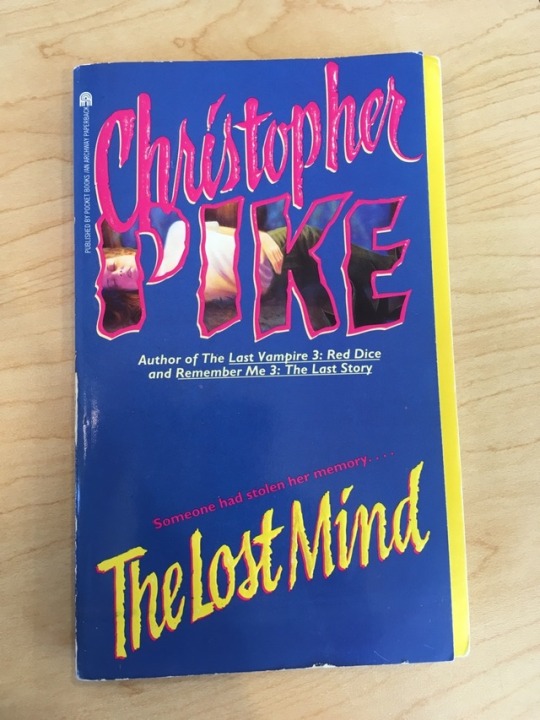
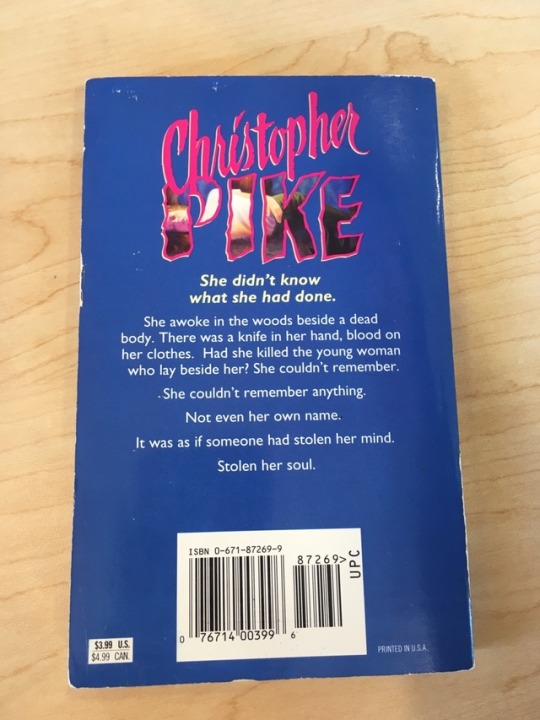
Pocket Books, 1995
213 pages, 16 chapters + epilogue
ISBN 0-671-87269-9
LOC: PS3566.I486 L6 1995
OCLC: 32826282
Released August 1, 1995 (per B&N)
A girl is dead in the woods. Unfortunately, the person who finds her is no help, because not only does she not know where she is or how to find help, but she also doesn’t know anything about herself. All she knows, instinctively, is that she shouldn’t let on where she was or that she found the body first, at least not until she can learn some more about what happened and how they both ended up where they did.
I was really looking forward to this reread, and I’m disappointed that it sort of falls flat. Pike does that thing where he perfectly captures the tone I want — the sinister anxiety of not knowing, the ultimate unreliable narrator who doesn’t even know her family, let alone what happened to have her wake up next to a murdered girl — but in the end doesn’t give enough details to satisfy the plot resolution. And honestly, I’m kind of torn about it. Part of what makes entertainment “good” for me is how much I am trusted to put together the pieces and figure things out over the course of the story. But it shouldn’t be on me to CREATE a major piece that fits into the hole in the puzzle.
It seems a little bit like a wasted opportunity, to be honest. This book is not only shorter than a lot of what he’s written so far, but I could swear that the type size is larger too. There was room to put in some of the things that I thought were missing, but I guess he just didn’t think of them as needing to be included. But I’m ripping this story down before I’ve actually recapped anything, and I need to do that to get there. (On the upside, they’ve gotten rid of the die-cut covers that shred on your bookshelf.)
We start, as mentioned in the woods. Our main character awakes as though from the dead, unusually cold and covered in blood, though she’s not seriously cut anywhere. The blood, it seems comes from the blonde girl lying nearby, who has been stabbed multiple times in the chest. And the knife that probably did it is within arm’s reach. As our protagonist racks her brain trying to think of where she was or what she did the night before, she comes to an unsettling realization: she can’t remember anything. And by “anything,” we mean
where she is
who she is
where she lives
where she comes from
NOTHING.
All she’s sure of is that she didn’t kill this girl, but that if she tries to report anything she’s the immediate and only suspect. And going to jail is worse than having no memory or personality. (Except she does, as we’ll see, which ... we’ll get there.) So she pockets the knife and blunders her way out of the woods, where she finds a car. The key is in her pocket, and there’s a clean sweat suit in the trunk. But she’s not ready to admit culpability in the blonde’s killing — she just wants to stay clear. She rinses off as much blood as she can in a pond before changing and climbing into the car, where she finds a purse with her ID. Apparently she’s Jennifer Hobbs from Carlsrue, Oregon, but none of this rings a bell or turns on any lights. All she can do is drive, toward the hint of lights in the distance that she thinks may be her town.
You might be thinking there’s a first suspicious plot question here. Why wouldn’t she drive AWAY from the town if she didn’t know anybody or anything, rather than putting herself at risk of implication in the death? I didn’t actually have a problem with this. Obviously it was a huge shock to wake up with no memories, and it makes sense to me that she wants to try to find them again, maybe through immersion in where she’s from.
So Jen calls home and talks to her mom, who wants to know if she’s with Crystal. She assuages her mom’s worries, sort of, but doesn’t go straight home because she doesn’t want to be questioned about her change of clothes. Instead, she gets a snack at Denny’s, where they ask why she’s out so late without Crystal, then finds a trash bin behind a store to dump off her bloody clothes. By the time she gets home, her mom is asleep, but she doesn’t know which room is hers and accidentally wakes her little brother, who insists they share a donut and talk about stuff that Jen doesn’t remember or understand.
Jen quickly falls asleep after this and dreams of a fortune teller near a wide river, who she torments with a sharp knife after smoking a powerful drug that dissociates her from her body. She is woken by her mom at the door, who asks if she’ll drive her little brother to school. Another slip: Mom refers to the kid by his name, but apparently Jen’s always only called him by a nickname, Gator, after his propensity to bite as a toddler. She gets him to guide her to school by letting him sit on her lap and steer, which is another weird thing for him, but hey, nine-year-old gets to drive so he’s not arguing too much.
The first person she encounters at her school is her boyfriend, a football meathead who immediately asks her for three hundred dollars. Obviously she doesn’t know why or remember agreeing to help with this, but she says that she might have an easier time finding the money if he walks her to all her classes. Only halfway through the day she has to bail because she’s learning more about Crystal, i.e. that she’s not in school and her teachers think it’s weird that Jen doesn’t know why. So she goes home and finds last year’s yearbook, and learns what we already suspect: Crystal is the dead body in the woods.
This realization hits Jen like a ton of bricks. She’s crying and she’s not totally sure why, seeing as she doesn’t remember anything. When she eventually calms down and reaches for her phone, she sees that she has messages on her answering machine. Three are from Crystal’s mom, growing increasingly frantic. The fourth is Amir, who wants to talk about last night. Finally, someone who was there and can help her figure out what happened! Amir is worried that Crystal might have run away, for obvious reasons. When Jen doesn’t get it, he says it’s because Crystal found out about their affair. So now not only was she the last person to see Crystal, and the one person in the world who’s closer to her than anyone else, and she woke up next to her body and a knife, but now Jen has a motive.
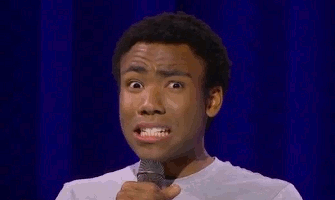
She calls the police and anonymously reports the body in the woods, then hides the knife in a nearby park. Denny’s calls and wonders why she’s not at work, and then her boyfriend calls and wants to pick up his money. She puts them both off, because she knows that the police are going to be around eventually, probably sooner than later. When they show up, she realizes that telling the truth (that she doesn’t remember last night at all) isn’t going to help her stay out of jail. So she makes up a whole bunch of details that probably create a story with more holes than if she were just to say hey, we went to Crystal’s boyfriend’s house and got so drunk that I woke up at like 2 without any memory of what happened. The detective is all over her on the inconsistencies and lapses in her memory (what is Jen’s boyfriend’s last name?), and ultimately she asks him to leave. Which he does, with the warning that he’ll be back with a warrant.
Her little brother asks why she’s having trouble remembering things. She says that this has to be a secret between them, and then she goes to read her diary and try to put some pieces together. She doesn’t really like the person she’s reading about, but she does learn that her boyfriend is in major gambling debt and that Amir has only been around for two months but that he wouldn’t let Crystal introduce him to Jen for some reason. Before she can get much farther, her boyfriend shows up asking for the money. Obviously Jen has been preoccupied and doesn’t have it handy, and while she’s scrounging it up her boyfriend takes off his clothes and stretches out on her bed, thinking of either a consolatory (sorry your friend is dead) or celebratory (I can pay off my bookies) screw. As Jen no longer has the baggage of actually knowing this person that she’s apparently been dating for two years, she can send him packing without remorse.
Amir shows up almost as soon as the now-ex is gone, in tears because a) his girlfriend is dead and b) the cops came and grilled him on suspicion of her murder. He thinks he’s being unfairly targeted as a brown Muslim, which ... yeah, probably, but also he was her boyfriend and one of the last people to see her alive. But Amir’s story to the police exposes the holes in Jen’s made-up facts even worse. Plus, he told the cops how he was planning to break up with Crystal for Jen. It pretty much totally screws her, but weirdly at that moment her dream comes back to her, and she asks Amir about Egypt and drugs. He says that hashish was common, but that he never did it because of what it did to his sisters, how it put them in a vulnerable position to be murdered.
When he’s gone, Jen falls asleep again and dreams of Egypt, of an ancient graveyard dominated by a statue of three warring demons, and of the same mystic refusing to give her information about the truth of the soul, but she gets her knife out and torments her more. Again she wakes up to her mom, who is sitting on the bed this time. Her mom wants her to get a lawyer, but Jen doesn’t want to, for ... reasons. Instead, she goes to see Crystal’s parents, to sit in her room and try to understand their relationship. Crystal’s diary is sitting on the desk, and there’s a recent entry about a dream she had. About an ancient graveyard and an old witch and a sharp knife.
Next she goes to Amir’s apartment. He’s out, but she talks to the landlady, who laments the loud arguments that Amir and Crystal were having near the end and how he seemed sick but insisted on watching movies in her living room the night Crystal was killed. She lets Jen into his apartment, where sure enough she finds a hash pipe. Only there’s no way he could have done it, because he has an airtight alibi of actually being somewhere else.
Jen gets home to find the police in her house. They give her a hard time about not being there, and produce a warrant to take her clothes and her shoes from the previous night, as well as searching her room and her car. It’s not looking good for not going to jail for murder; the detective tells her that he’ll be back in the morning, probably with a warrant for her arrest. She does take a minute to enlist Gator to sneak out and steal Crystal’s diary out of her room, which he does because he hopes it’ll help her prove she didn’t kill Crystal. Comparing and cross-referencing the diaries, Jen learns that yes, Crystal and Amir were fighting but that no, she never actually slept with him. Why would Amir lie about this? What does he know?
There’s only one way Jen can think to figure this out: dream some more. In the dream, the mystic tells her about how the human soul is too grand to be born into one body. It takes three, but the three parts are never incarnated in the same place, because terrible things can happen if they all come together. The three-demon statue is symbolic of this: an explosion of uncontrollable evil. However, dream-Jen is not deterred by this. If anything, she wants to make it happen even more, to the point where she’s willing to kill the witch to stop her enforcing her considerable will and magic on her son to stop him going.
Apparently dreaming works, because Jen wakes up knowing what to do. She starts by writing a suicide note. There’s a police officer guarding her house, but she knocks him out by mixing him up a fresh thermos of coffee with a couple sleeping pills mixed in. She pockets the rest, takes the officer’s gun, and heads over to Amir’s place, where she forces him into her car at gunpoint. They drive out to a certain spot in the woods, where she makes him lie facedown on the ground while she swallows the rest of the sleeping pills. Then she ties him up and marches him to the spot where they found Crystal’s body and makes him explain.
Amir confesses that he smokes hashish to try to reach his soul, which is part of why he came to Oregon to seek out the other parts of it. He’d flipped on Crystal, going from amazing love to deepest hate (which is a sides-of-the-heart discussion that Pike’s brought up before, maybe from Hinduism) and thought maybe Jen would be his correct answer. Only when they all came into his apartment that night, the demon door opened and everyone’s souls left their bodies. Amir managed to gain control, not just of himself but of Jen’s body. He forced her to drive Crystal to the woods and murder her, all while he sat in his landlady’s living room. And then he brought his soul back to his body, but Jen’s was totally gone.
And here’s the big hole that I’m left trying to fill myself. If Jen’s soul departed when it was forced out of her body, what the hell is in there now? Like, SOMETHING is giving her emotions and desires and needs to act upon. SOMETHING is motivating her to stay out of jail, to protect her friend and her family, to try to teach her degenerate ex-boyfriend a lesson. What is it? Is it the physical memories of having spent time with these people, manifesting in her mind as a placeholder? Is it just a blank slate from nowhere? Is it part of Crystal’s soul that flew out or broke off when Jen was stabbing her to death, too traumatized to remember anything? There’s no answer, and it’s unsatisfactory. Like, if her soul is just gone, then what is driving her to keep saving her own life?
Also, without actually knowing that this was something that could work, Jen sure did take a massive risk overdosing on sleeping pills before switching bodies with Amir. She says she’s going to kill him with ultimate suffering, so he can feel a fraction of the fear that Crystal had, and she pulls out a syringe and stabs it into his neck, saying she’s about to put a bubble in his vein. This is the act that finally frightens him out of his body and forces him into hers, where he then gloats about winning and leaves her to die in Amir’s body, tied up in the woods.
What he doesn’t know is what kills him. Jen planted the knife just underground, by where she tied Amir’s body, and it’s not hard for her to dig it up and cut herself free. She is amazed to find Jen’s body in the car, a long way to make it on thirty phenobarbitol pills. She drives it home, puts the body in bed, waits for it to stop breathing, and then walks back to Amir’s apartment, sad but relieved.
The epilogue is Crystal and Jen’s joint funeral. Jen’s mom shows Amir the suicide note, which insists that she didn’t kill Crystal but that this is her only way out, and Amir suggests she should believe the note. Then he goes to find Gator, who is confused when Amir calls him by that name but then joyfully realizes that Jen perhaps didn’t die after all, that maybe she just needed to remember in a different way.
And that’s The Lost Mind! Better than a lot of stuff from this era, but still with some holes (and at least one is a monster). I don’t mind figuring some stuff out for myself, and I don’t mind an author keeping me in the dark until the appropriate moment. But eventually, they better turn on the lights, because it’s not my job to write the story, and ultimately that’s what happened here. I love the idea, and I love the tone. But who is Jennifer Hobbs? We don’t ever actually learn this, and the whole story suffers as a result.
2 notes
·
View notes
Text
Lowbrow, Postmodern & Me: PEOPLE MAKING DANGER
What the hell is PEOPLE MAKING DANGER? Super question!
This is an announcement, of sorts (given the world at the moment) . . .
Hey, I’ve got another book coming out, which means another opportunity to explain myself begins in . . . 3 . . . 2 . . . Hello! Great news!
Review copies of the short story collection PEOPLE MAKING DANGER are free for a limited time at AdamFike.com.
Highlights include a suburban thriller, a sci-fi satire, a western with cars, a magical musical history and antihero redemption story. All reviews are welcome at: Goodreads.com.
Fine, you say. But, before I bother, what is it, really? Everything online needs an overall category, does it not?
Evidently.
So, I’m going with the term Lowbrow Postmodern, based, at least, on my own interpretation of what those words mean.
In this case, lowbrow refers to the elements and postmodern is what I did with them. The medium is words in the form of short stories. Yay!
Please note: I am likely very wrong. So, how about I tell you the basic idea and you tell me if I got there or not?
SO, WHAT IS LOWBROW?
In 1979, Rip Off Press published a book called The Lowbrow Art Of Robt. Williams because the idea of highbrow really stuck in the painter’s craw.
(Also, evidently the name Robert has the coolest abbreviation ever.)
Though here he was, reaching into their chests with a towering scream painted from their own insane culture, critics called his work cartoons, pure entertainment, anything but art.
One way to sum up Williams’ reaction to this point of view is that if your personal cultural measure doesn’t have a notch for his kind of thing, feel free to go fuck yourself (and a little love would be nice too). There is a terrific documentary about him on Amazon.
As a kid growing up around antique race cars on dirt tracks, my Dad had a ’32 Deuce Coup stock car and the sound was pure magic. One afternoon, he walked through the flea market and came back to the Winnebago with this poster:
It was the first time I saw something that looked how I felt, or maybe just wanted to feel. I had that poster through high school and college, until it succumbed to a combination of basement floods and hotrod enthusiast mice. Doesn’t matter, though. That painting is forever in my mind. Notice, none of the wheels are touching the ground.
The idea for PEOPLE MAKING DANGER is to operate as simply as possible, with familiar elements, and to get out of the way of the stories. To let the thing talk directly and skip the fancy rationalizations and references. To strategically break certain rules because that’s when it all takes off and flies around the room. Hopefully.
Some things you might notice: There are no quotation marks because it’s always the narrator talking. The stories are broken into three acts because there’s a human rhythm to that which people recognize. Characters are often named for their function and those names are capitalized as proper nouns. And the stories are generally told in the present tense.
FINE, THEN WHAT IS POSTMODERN?
Postmodern primarily means popping the classic balloons of objectivity: reason, morality, reality, truth, whatever you got. Einstein proved that time is both subjective and subject to a level of physics we may never completely understand. So are people. So are their stories. It is whatever you want it to be, combining every historical event, every cultural moment and all the methods of craft you can muster, plus medium and commerce, with some random memory from your fifth birthday. Only you can inform your art, because the whole world is inside you. At least the parts that matter. Also, only you can prevent forrest fires (see: Steven Wright).
For instance, the familiar elements I repurpose in PEOPLE MAKING DANGER include genre and a variety of cinematic tropes. Ideally, the results include unreliable narratives, antiheroes and a whole lot of irony. Telling a story this way means taking everything apart and resorting it in order to, maybe, find a more accurate truth, utilizing the difference between face value and the underlying choices.
Which, you say, is, by my own definition of the thing, impossible. Aha!
To which I say, yes, so, if you’re going to do the impossible, why not make it fun? But I wouldn’t throw a big aha at you like that. I’m not an animal.
The universe is a cloud of balancing numbers. Humans create their gods. It’s not that there isn’t an objective view somehow, somewhere. It’s that, as human beings we can only get a glimpse of it by standing on one foot, with an eye closed, focusing on the abstract . . .
. . . or possibly, as Zimmerman wrote, to dance beneath the diamond sky with one hand waving free.
SO . . . LET’S JUST RELAX
These stories did begin life as movie scripts and are meant to perform for you. Construction, presentation and the delivery are all part of the idea. The trickiest part of all this is predicting human reactions. I personally find making things a whole lot easier than showing them to people. Unfortunately, it makes no sense to create for no one or to aim only for some highbrow opinion.
Capturing someone’s attention is a complex thing. Much more luck than skill. The simple proof is every movie, book, TV show or song that should have been really good but really wasn’t. And also Saturday Night Live.
What happens in that moment when people pause their show and never come back? Is it cumulative? Is it pacing? Is it tone? When did they put the book down? What page was it? Too much talking? Not enough?
Exactly.
There are no answers to any of this, just a whole lot of trial and error. I certainly wish there were nice, clear guideposts and can testify that this kind of circular inner conversation will make you crazy.
HERE’S WHAT I DO KNOW:
To say a complicated thing simply, you need a good head start. Folks need to have an idea of what they’re looking at before they completely know what it is. They need time to settle in, a little structure and as few groaner moments as possible. It’s all Aristotle. All anybody wants from their entertainment is catharsis. To take a quick ride through someone else’s story, hopefully an engaging one, to maybe learn a few things, have a couple laughs, cringe a bit and move along with their day, happily unattached.
So, then, what’s the difference between art and entertainment? Who cares?
Lowbrow, meet postmodern: PEOPLE MAKING DANGER
More here: www.adamfike.com.
Meanwhile, don’t forget to check out our library of original comedy and music on Wyndotte Street (www.yndotStreet.com)
Lowbrow, Postmodern & Me: PEOPLE MAKING DANGER was originally published on Wyndotte Street Presents Original Comedy And Music
0 notes
Photo
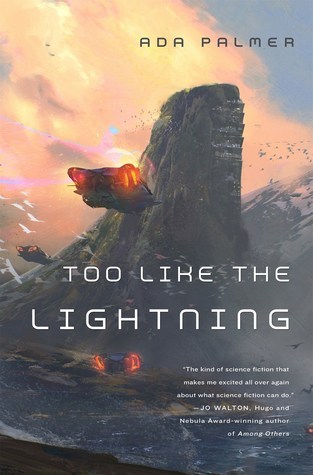
“In Action How Like an Angel, in Apprehension How Like a God!” Ada Palmer’s Too Like The Lightning
Liz Bourke
Tue May 17, 2016 2:00pm
Juliet: Well, do not swear: although I joy in thee,
I have no joy of this contract to-night:
It is too rash, too unadvised, too sudden;
Too like the lightning, which doth cease to be
Ere one can say ‘It lightens.’
–Romeo and Juliet, Act II Sc. II
Homer and de Sade, Voltaire and Samuel Delany, Diderot and Alfred Bester: Ada Palmer’s Too Like the Lightning wears more than two thousand years of influences on its sleeve. It wears them lightly. From the author of Reading Lucretius in the Renaissance comes a devastatingly accomplished speculative fiction debut, an arch and playful narrative that combines the conscious irreverence of the best of 18th-century philosophy with the high-octane heat of an epic science fiction thriller.
Step up your game, science fiction. The competition is here, and it’s self-aware, wickedly elegant, and intoxicatingly intelligent.
But what, you might ask me, upon hearing this superlative praise, is Too Like The Lightningactually about?
People, politics, society, philosophy, theology, and what you’ll destroy to save your world—or a better one.
Mycroft Canner is our narrator: a Servicer, a criminal deemed harmless and sentenced to live a life of useful work according to the customs of the 25th century. The world in which Mycroft lives is familiar enough to be understandable and yet still an alien, inventive future. This complicated utopia, built on technological abundance, exists in a careful balance of forces: it survives in the absence of anything like a majority, and its inhabitants affiliate themselves with global bands of the like-minded, called Hives. The powers and princes of this world are not necessarily immediately obvious, and the outward rules may be inwardly broken. In a world where the public practice of religion is prohibited, the child Bridger—who can, it seems, make inanimate objects come to life, who can produce miracles—could be as destabilising a force to the peace as a threat to the world’s transport system.
Palmer’s narrator is a knowing—and unreliable—one. This isn’t a novel that pretends it exists without an audience. Mycroft adopts a self-consciously archaising tone, drawing occasionally on the style of the 18th century Enlightenment that their age takes, at least in part, as inspiration. Their attitudes, in combination with the assumptions of their 25th century, give some elements of elegant mindfuck to the narrative. This is an extraordinary voice, versatile and engaging, arch and wry: deceptively straightforward.
(I’d call Palmer’s approach unapologetically baroque, were it not for the fact that every throwaway decorative line comes around to supporting something significant.)
So many excellently well-drawn characters. Such a sly and clever sideways interrogation of our categories of gender. Such an elegantly blasphemous—though one might say iconoclastic and be just as accurate—approach to religion and society. Too Like The Lightning isn’t a didactic novel. Instead, it presents certain things—certain themes—and invites engagement. Invites argument, without being argumentative. Let me argue with your philosophy and philosophers, your histories, your world!
Ravishingly, uncompromising, deceptively intelligent, this is a book that combines the appeal of Jo Walton’s The Just City and Ann Leckie’s Ancillary Justice with the furious complexity of Max Gladstone’s Craft novels. But it’s nothing like them, exactly. It’s resolutely its own thing: one part theology to nine parts political and personal thriller.
The single complaint I have about it, in fact, is that it is only one half of a whole: part one of two, and the second part, Seven Surrenders, will not be with us until December. I cannot wait that long to see how Palmer solves this gloriously complicated narrative equation: I can’t imagine that she’ll fail to stick the dismount, but damn do I want to see how she succeeds.
I want to see it right now.
Too Like The Lightning is an excellent novel. If it doesn’t show up for award consideration next year, I’ll be very surprised. It’s good—and it’s only Palmer’s debut. If this is how she starts, I’m going to seriously enjoy the rest of her fiction career.
4 notes
·
View notes
Text
Mistborn first read- The Well of Ascension part 1.0 chapters 1-5
Spoilers for the chapters covered
On this post I began to go further in depth, and give a little bit of a recap, at least in some places if I had anything to say. I was going to try to avoid Wheel of Time comparisons, but I got a few chapters in and failed miserably. So starting with this one: is people rolling their eyes the smoothing of the skirt, sniffing, or braid tugging of this series?
Expectations and predictions:
•Since it’s the title of the book, I assume that by the end we will know what the Well of Ascension is or what it does. Right now it’s some mysterious thing we keep hearing about that has something to do with how the Lord Ruler got his power, but not much beyond that is known.
•I still worry about Marsh. He was instrumental in defeating the Inquisitors and the Lord Ruler in the previous book, but he went in deep for the cause. That can’t be good for his mental or emotional state. I think something bad is going to happen with him.
•Vin will continue to get more badass as she gains more experience with Allomancy. Maybe she’ll even figure out how to use both Allomancy and Feruchemy like the Lord Ruler did.
•The Deepness will continue to exert its influence on the world, and make things uncomfortable for everyone.
Part 1.0: Heir of the Survivor (chapters 1-5)
Chapter 1
There’s no prologue! Wow! Nonconformist! Haha
It’s the beginning of the second book and there is an enemy army already. Where did it come from? Are there other nations? Is it led by Inquisitors, or perhaps noblemen? Aha, it’s Elend’s father.
Ham still says, “the Lord Ruler only knows...” I guess old habits die hard.
Or else he’s an enemy agent. I’m sure some of the characters are. I suppose I should keep an eye out for clues.
OreSeur (the kandra formerly known as Lord Renoux) meets up with Vin, “...tone respectful—yet somehow still a little hostile. As always.” Why does he sound hostile? Should we not trust him, or is this just how Vin perceives him? Is this an unreliable narrator situation? Does he resent the fact that Kelsier is dead, but he still has to serve Vin? Is this just a personality quirk?
Vin has been following a mysterious person who may also be following her. Looks like that person, or someone else is attacking her. *cue dramatic music
Chapter 2
Vin’s attackers are eight Mistings. The mysterious Watcher (why the capitalization?) briefly interferes, seemingly helping Vin, but for the most part she is on her own, eight against one.
As the fight goes on, and Vin beats several of the attackers, the Watcher helps again, revealing a Mistborn among the other Mistings. Vin is forced to use her last bit of Atium in order to defeat him. She will be vulnerable after this.
OreSeur is injured and will need to find a new body, but Vin won’t let him use any of the attackers. I wonder why, seems like that would be convenient. Well, I mean obviously she’s squeamish about the whole thing, but get over it Vin. You just killed a bunch of people. It can’t be that much worse. Just don’t watch him do it.
Chapter 3
Elend’s political theory clashes with real life practical implementation.
Vin used the mist to fuel her Allomancy in the fight with the Lord Ruler. I missed that part in the first book. Was it even mentioned? Will she be able to further develop this ability?
Vin senses someone burning metals, but has trouble figuring out where it’s coming from. Then she sees a faint figure forming in the mist. Shoot first, ask questions later; great plan Vin!
Ham tells Elend and Vin that the assassins Vin fought earlier were from the west, which means they probably weren’t sent by Elend’s father. Ham thinks they were sent by a western king named Ashweather Cett. Elend is worried about being overwhelmed by foreign armies and doesn’t think his kingdom will last much longer if they don’t come up with a plan. He lists off all the problems they are facing. “Oh, is that all?” Ham said. “See? It’s not so bad after all. I mean, we could be facing an immortal god and his all-powerful priests instead.” Bah duh buh
Chapter 4
Sazed is examining the body of a villager who died mysteriously. Another villager witnessed mist swirl around the man before he died. This was during the day, which is unusual because the mist normally only appears at night. Perhaps this has something to do with the misty figure Vin saw earlier. Maybe shooting first actually was a great plan. I doubt this person or entity would be forthcoming if she had asked questions first. Ooo...could this be the Deepness, or something related to it? (Resist the WOT comparison...resist the WOT comparison...AAAARRRGHH...sorry I have to do it at least once.[spoiler warning] Is it like a bubble of evil from the Dark One? Nah, I’m sure it’s something different that I’m not aware of yet.)
“...not to mention Sazed’s own experience several weeks before.” What was his own experience? Was that mentioned and I missed it, or will he go into it later?
After he buries the man he tries to teach the villagers about the religion that their ancestors may have followed, but they show little interest. “There are other things—more practical things—that I can teach you.” Hmm, I wonder what that will be.
Chapter 5
“And I am the one who betrayed Alendi, for I now know that he must never be allowed to complete his quest.” I’m really interested to see how this Kwaan came to feel this way. What did he find out?
Vin reflects on where she came from, both her life as a skaa street urchin, and her time pretending to be a noblewoman. She notices someone following her unskillfully. Soon others join him. They are skaa, expecting her to lead them where the Lord Ruler once did. She briefly interacts with them, but is unsure how to respond.
She gets away from them, comes across a merchant selling dogs, and asks for a wolfhound. The merchant tries to sell her a small, docile one, but she picks the biggest, meanest one she can find, and punches it in the head, knocking it out. “Oh, for the Lord Ruler’s sake...” Okay, it’s not just Ham; old habits do die hard.
She takes the dog to OreSeur and commands him to use it as his new body. Okay, that is not where I saw this going. I thought she was going to use it as a regular guard dog. That is clever. Will he be able to talk with his new dog mouth? If he didn’t resent her before, I’m sure he will now.
Vin receives a new alloy from Terion, an Allomantic metallurgist, a combination of aluminum and copper called duralumin. Is duralumin an actual thing, or something made up for the book? I wonder what it does, if anything. I’m sure it does something, otherwise why bring it up?
“...but you did not command me to tell you if packages arrived.” Uh oh, definitely resentment. I don’t remember him being this sassy in the first book.
Elend and Dockson apparently pretend to like each other for the good of the kingdom.
Vin and Elend discuss OreSeur the dog, and how Elend would prefer Vin to have the kandra with her when she goes out. “...they’re incredibly loyal—I’ve never heard of one breaking Contract.” There’s a first time for everything, Elend! Discussion turns to Kelsier, and how Vin loved him as a friend, but couldn’t be in love with him. He was too harsh. Elend remembers how Kell saved his life, and how that surprised him. Vin tells him it’s because Kell knew she loved Elend, and that was enough to overcome Kell’s hatred of the nobility.
Ham shows up and Vin decides to test the new alloy. It doesn’t appear to do anything, but at least it doesn’t make her sick. Ham wants to practice sparring. Vin wants Elend to as well, so he is able to defend himself. It’s funny how Elend is trying to convince Vin to take someone along for protection, and Vin is trying to convince Elend to learn self defense, but each is resistant to the other’s argument.
*This is going to be significantly longer than my post about the first book. I’m going to break it up into sections so it isn’t a mile long. I’ll see ya when I get through the next batch of chapters.
0 notes
Text
TV Reviews: Thirteen Reasons Why
This... was a tough one to get through.

I read the book by Jay Asher when I was 15 and fell in love, so when I heard there was going to be a Netflix series, I was all aboard and excited. But that quickly switched to concern as the criticisms came out almost immediately. I was still willing to give the benefit of the doubt and maybe some good would come out and... well, let’s start with the story.
Heads up that there may be some slight spoilers, but just in regards to discussing the graphic content of the later episodes. I’ll keep it as vague as I can, but it’s something that still needs to be talked about. If you’re still concerned about content and if it’ll trigger you, I hope this is extensive enough. And I will make a separate post for major spoilers
A small town is shaken after the sudden suicide of a teenager named Hannah Baker. With a lawsuit building up against the high school, there are more questions than answers to why Hannah did what she did. That is until one of her former classmates, Clay Jensen, receives a package of cassette tapes, starts playing one, and hears Hannah’s voice, saying if someone is listening, then they are one of the reasons why she was pushed to suicide. And the series revolves around Clay trying to figure out Hannah and find out the truth from those who hurt her.
From the get-go, anyone can tell this series was a massive expansion of the book. While the book was entirely in Clay’s perspective and he finishes all the tapes in one night, in the series, he actually interacts with the people who listened to the tapes before him, trying to uncover the truth. Each tape gets an hour long episode for Clay to slowly digest everything Hannah says, especially with anticipation building up to his own tape and how difficult it is to listen to the crap she endured. You also see multiple perspectives, including the others on the tapes, and how they were affected. Of course, there’s also the Bakers filing the lawsuit and trying to figure out their daughter, and Clay and Hannah’s relationship is also expanded. These changes are welcome and necessary if all these stories are to be told in their entirety, so I appreciate the producers knew not to cut corners, especially with the subject matter.
I liked the differences between scenes set in the past and those in the present with the former in warm tones and the latter in cool tones (and also Clay having a scar through the series). It’s obvious yet clever signs to tell when the story is being told out of order; I just like little details like that. It was also fun to watch scenes play out like a typical YA drama (indie music and all), but they don’t overstay their welcome and draw you back into the gritty reality of it all. The show doesn’t shy away to bring up subjects like slut-shaming, rape cultures and the double standards of high school girls and boys. And Tony grew on me to become one of my favorite characters of the whole show from his demeanor to his design; he’s just fascinating to see how he’s involved in all of this without actually being on any of the tapes.
Out of the many criticisms, people say Hannah committed suicide for a sick revenge fantasy rather than actual depression. Even though I don’t interpret it as such, I’d be lying if I said I didn’t see where people were coming from, especially since the show plays up Hannah to likely be an unreliable narrator. But even though a ton of people listened to the tapes before Clay and were told upfront how and why they hurt Hannah, they’re still hypocritical assholes and remain in total denial of any wrongdoing even at the last episode. It reminded me a bit of Heathers and how everyone reacted to Heather Chandler’s supposed suicide right down to the memorials and going on and on about how sad and tragic she really was when in reality, everyone hated her. There’s almost a dark comedic aspect (not to the same level as Heathers) where everyone suddenly cares about the signs of suicide, blissfully ignorant that they were witnesses and enablers of Hannah’s bullying, particularly Courtney-- who I swear reminded me way too much of nearly every high school girl I knew in ASB with their high and mightiness. They were just fake. It’s still problematic as hell, but I think it’s an interpretation that needs to be taken with a grain of salt when you break down the facades these people are putting up to avoid accountability. Some definitely start reevaluating their behavior and what is and isn’t the truth with some powerfully emotional scenes, even calling each other out for their bullshit, but those still in denial are important to note as well for the true nature of people even in the face of tragedy.
Besides, it’s not really a problem with how Hannah chose to distribute her suicide note; she’s just sadly not that well written, at least compared to the rest of the cast. Everyone else has pretty clear cut signs of depression and other mental health problems, but you don’t really see that with Hannah until the last couple episodes or so. There are definitely mentions of loneliness and lack of prospects for a future, but compared to everyone else, it’s almost glanced over, which sucks because, well, she’s supposed to be one of the main focuses of the story. Some of the reasons she listed aren’t even that well explained as to how she was affected, so it leads to a number of viewers interpreting her as selfish and manipulative when we know that wasn’t supposed to happen. And yeah, I understand depression varies person to person and teenagers don’t always know how to communicate their problems and trivial things to adults can be big deals for teens-- I was a teenager once upon a time too--, but Hannah just needed way more focus rather than trying to make characters like Justin sympathetic even when they honestly don’t deserve it. There’s also a lot of inconsistencies from the characters’ actions to the messages that just muddle everything up, but I’ll save that for spoilers.
But the big talk of this show? The graphic and triggering content as you can see below (shout out to @bezukhova for making this chart, and I tried seeing about pin pointing other time slots to skip, but it’s edited with so many jump cuts, it’s near impossible).
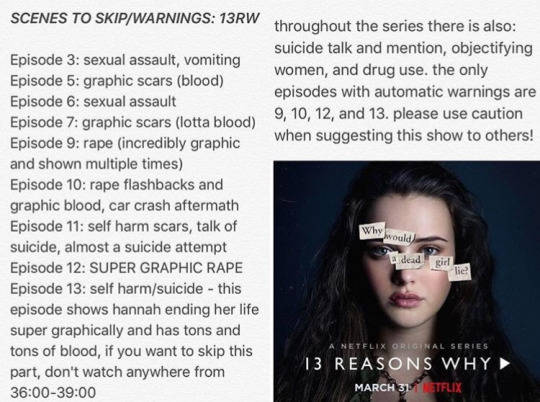
Yes, it’s about as unnecessary as you would think and only serves for shock value. I give Netflix credit that they had the automatic warnings when they did, and I think it’s a start for an easier time for their customers to stream movies and TV shows comfortably. But... why?? Was there a reason to push it this far and even go out of their way to change Hannah’s suicide method from the book?
And yes, I did watch the Beyond the Reasons special to understand why they did what they did. They dragged on quite a bit about being “real and authentic” and “want[ing] it to be painful to watch.” For starters, if you can’t figure out that suicide and rape are horrible things in the great year of our lord 20 fucking 17, I don’t know what the hell is the matter with you; you don’t need a TV show to spoon-feed it to you. Not to mention, they’re still losing a potential audience of people who might be looking for such a fictional narrative for some form of help in their trauma and having them sit through the same things they already endured is a horrible way to go about that. I know people who flat out refuse to watch stuff like Game of Thrones because of the rape content; it doesn’t matter if the rest of the show is good. These survivors know what will likely set off an anxiety attack, and that is not a game they’re willing to play, period. It’s honestly kinda insensitive that they didn’t take that into consideration when making those scenes which sucks because it does include some interesting talks about rape culture (to an extent anyway, but again, spoilers).
There are ways to portray this content and be subtle. Compare some of this content with how it was handled in Perks of Being a Wallflower (definite spoilers if you haven’t seen the movie or read the book, but this is important to compare).
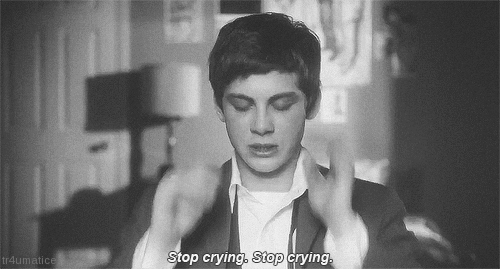
Towards the end of the story, Charlie starts having an anxiety attack when he tries to have sex with Sam. This sets off a ton of flashbacks of repressed memories of his aunt sexually abusing him shortly before dying in a car accident. And his mental state deteriorates to the point where he contemplates suicide. All you see is his aunt touching his leg and saying “don’t wake your sister.” All you see is the camera pan towards a knife on the kitchen counter (you don’t even see him pick it up) before the police break in and Charlie wakes up in a mental hospital. That’s all you need to figure out why Charlie is breaking down. No over-the-top graphic content, just subtlety because damn it, your audience is capable of critical thinking. This is how you do it without making your show a giant trigger.
And to top it all off, Thirteen Reasons Why fails to deliver clear-cut solutions to the problems presented. It’s just misery on top of misery for everyone, and if you’re trying to go for a “it gets better” message, it doesn’t work. I know the ending is super ambiguous and there’s potential for a second season, but how long can some of your audience afford to wait when all you have to offer is one link to a website? The only worthwhile stuff they talk about is about rape culture and dispelling myths and a quick guide to consent. But if teenagers have a hard time verbalizing their problems, what can they do to fix that? How can we identify signs of depression and suicide way earlier on? How can we better listen to victims and not shame them? What are the best mental health centers and hotlines to reach out to? How does someone going through similar trauma as Hannah cope in a healthy way? A lot of the solutions the producers discuss are so vague and offer little to nothing for the audience, especially those who might be seeking help.
I’m sure this review might seem all over the place, but that’s pretty much my thoughts on the show. The scenes that are done well are worthwhile like Jessica in the later episodes or whenever someone calls someone out on their bullshit. And the whole cast does well with what they’re given to deliver such raw emotional pain and conflict. And I know the crew was had good intentions to make a statement about dozens of issues for teenagers and knew to take its audience seriously. But on the whole, it’s pretty clunky at times. I think it’s one of those shows where you have to watch yourself to make your own opinion, but this is not the go-to resource if you’re looking for help, especially if the graphic content can make you feel worse. I’m sure others will find more good in it than bad, and I don’t totally regret checking it out, but from what I was expecting, it was kinda a disappointment aside from some select scenes and performances.
5 notes
·
View notes
Note
(please bear with me) Okay, so, I'm a 15 year old freshman in highschool, and I've wanting to create some sort of series, whether it be a comic, or something else for a few years. I haven't too serious about it, but after one my of my friends showed me your video, for some reason, i was especially inspired. Now, I already have one character... but that's all i got. How did you come up with the things in your film? And did you ever experience "writer's block"? and if so, how did you deal with it?
No worries dude! So okay, I’m gonna’ be honest, when I read this, I was hit with such a weird mix of, like, “god this is literally impossible to answer”, and “man I remember feeling that way when I was 15″. So I guess the best thing I could do is elaborate.
I 100% absolutely know the feeling of “I want to create some sort of series.” Cause that’s the thing right? You don’t always know what you want it to be about, or what format you want (comic, animation, etc), you just know that you want to be known as an artist who is creating an on-going series. But maybe you have some vague ideas about scenes that you want to happen. Maybe you have an idea of the kind of relationships you want to portray. Maybe you have some lines of dialogue or a couple jokes. In this case, you even have a character! Which is great! Now you’re really eager to get started!
I had a bunch of vague ideas like that. I had characters I wanted to use for a story, but didn’t know what their story was. Sometimes I’d try and start a comic; I’d start to try and tell their story… but I would get a few pages in and give up, because I realized that I didn’t actually know where it was going, and so the characters would get kind of goofy and I’d try and pass it off as a lazy meta joke. There’d be some Ambiguous Shadowy Figures™ running the Evil Science Laboratory™ that my Main Character Bishounen Boy With Wings For Some Reason™ had escaped from. I didn’t know what the hell I was doing, I was just really excited to draw a pretty anime boy with angel wings.
I jumped right in to making comics like this maybe… 4 or 5 times? And every time went roughly the same. Looking back now, I couldn’t tell you the characters’ names, or what half of them looked like. I wasn’t even being facetious about the winged anime boy; that was a literal, actual comic I tried to draw in 6th grade, and I had completely forgotten about it until just now as I’m typing this. You’re probably going to have a lot of ideas like that. You might see characters come and go who never really get a story. That’s going to be part of your journey as a storyteller. Maybe your series won’t fizzle out after a few pages of bullshit like mine did (in fact I can already tell you’re more cautious than I ever was, because you’re aware of your situation and asking for advice… that’s another reason I’m so compelled to answer this ask; when I was your age the internet was different; social networking platforms weren’t a thing and I didn’t have a way to contact artists I looked up to and ask for advice, so the least I can do is try and fill that role now. This is a whole ‘nother topic, but TO GET BACK TO IT) I’m here to tell you that, IF IT DOES, don’t sweat it. You will get better at writing, you will get better at creating characters, and, god-willing, you will surely have better ideas than Pretty Anime Boy With Wings™.
Now, to move on to the part that’s (hopefully) actually helpful.
You used two phrases that I find interesting. I already mentioned the first one, “some sort of series”, but the other one I’m zoning in on is “How did you come up with the things in your film?” I want you to know that I’m by no means trying to talk down to you here, because this is actually a very straightforward way of asking something you might not have all of the right vocabulary for yet, but I take it what you’re asking is “how do you tell a story?”. If the first few paragraphs I wrote correspond with “man I remember feeling that way when I was 15”, then these next ones are gonna’ be the “god this is literally impossible to answer” part, and I’m just gonna’ go ahead and apologize for that right up front, man! Haha.
See, because that’s SUCH a huge question… that’s the part that I still struggle with. That’s the part I said you’ll get better and better at over time—and you will—but I think it’s something you’ll always be learning to get better at. I went to visit my family for the holidays and I borrowed a book to read on the plane: Story: Style, Structure, Substance, and the Principles of Screenwriting by Robert McKee. I only got a couple chapters in before I remembered that I get motion-sick like a motherfucker and had to stop, but even in a few chapters I learned some new things. You will constantly be learning and growing and bettering your skills, so don’t forget that!
There are lots of ways to tell stories, because there’s lots of different kinds of stories to tell. Some methods work better than others. I would suggest finding some things you like and making note of how they function… really dig in to them. Maybe when you were a kid you took a clicky pen apart to see how it worked and then put it back together. Try doing the same with the media you consume. Not to turn into a cynic or anything, just out of curiosity to learn what makes it tick. Think of it as STUDYING the comics and shows and movies you like.
Since you’re asking me, I’ll use Welcome to Hell as an example to try and give you some things to think about. I consider W2H to be character-driven; the character’s actions are what moves the story forward, the characters aren’t being forced to act because of the story. There’s nothing wrong with either method, of course, it just depends on what you’d like to do. Maybe since you already have a character, you can find a way for them to drive the story. What do they want? How will they get it? What’s stopping them? Is their conflict internal or external? I think Sock has two wants: he wants to kill stuff, and he wants to be Jonathan’s friend. What’s stopping him is that his two wants conflict with each other (an internal conflict), and also that his boss is the devil and there may be repercussions if he slips up (an external conflict). Characters don’t have to have an internal and external conflict, and they don’t have to have two wants—in fact that’s actually a little convoluted—but I’m just using it as an example.
Another useful thing to think about when telling a story is the structure. From Wikipedia: “Narrative structure is about STORY and PLOT: the content of a story and the form used to tell the story. STORY refers to the dramatic action as it might be described in chronological order. PLOT refers to how the story is told. STORY is about trying to determine the key conflicts, main characters, setting and events. PLOT is about how, and at what stages, the key conflicts are set up and resolved”
There are also different categories of narrative structure. W2H is basically a linear narrative, for example. It does technically start at the end and then explain how we got there, but the majority of the story is told in chronological order. The reason it starts at the end is because I wanted to establish Sock and Jonathan’s relationship and the tone of the story right off the bat. I thought it might be too confusing to start the story with Sock murdering his parents and then have it turn into a buddy-comedy half way through. So I started it on a scene where they already know each other and have an established dynamic. I also think starting it there creates a bit of intrigue: “why is this kid phasing through a fridge? What the fuck is happening? What is his job? What the FUCK is his job??? SHHH!!—The unreliable narrator is about to explain it!”.
There are literally TONSSSSS of aspects to think about when writing a story, and it’d be impossible for me to go through all of them, but hopefully this will be helpful for you to get started. If I were you, in addition to studying the stories you like, I would do some research and reading online. You can always google terms like “storytelling 101”, “narrative structure”, “writing characters”, etc. One of my favorite resources to read through was always (and still is) TVTROPES. It’s like a wiki for the tips and tricks of telling stories… I used to spend HOURS just getting lost in that site, clicking on different articles and finally learning that there were TERMS for the kind of things I constantly think about. Very invaluable resource.
And now, for the last part of your question, unfortunately, “writer’s block” is something that will never go away, haha. There are ways to get through it, for sure. Sometimes I’ll read TVtropes a bit if I’m really hellbent on figuring something out. Other times I’ll just take a break to draw a little bit because I think my thoughts form more coherently and naturally when I’m drawing. You might find different things that work for you!
IN CONCLUSION: If you want to create some sort of series and tell some kind of story, just work towards getting good at it. If you try to start a couple comics and they don’t pan out, it’s no big deal, because even making something unsuccessful is an act of learning how to get better at it. You said you haven’t been too serious about it until recently, and that’s fine too, because being serious about it doesn’t necessarily mean you have to go out and create a successful series right this moment, it can mean just striving for that goal and bettering your craft. You have plenty of time to grow into an amazing artist and make all kinds of kick-ass stories, so always hang on to your drive to keep creating things!
Oh! And just a fun fact: I think I first started having the vague ideas that would develop into W2H when I was, what, 17-18? ish? I tried making it into a comic when I was maybe 21… and I made the film when I was, I don’t know, 24? I’m 28 right now. So that’s something to keep in mind: good shit takes time! You’ll probably have a lot of ideas come and go, but if something sticks with you for 10 years, there’s a good chance it’s worth bringing to fruition. There’s definitely no rush to develop something you really care about.
BONUS:
Here is a previous ask i’ve answered about storytelling tips!And here is another one!
You can also search my blog for “art advice”, “story”, “writing”, “character”, “animation”, etc., + “ask” to see if I might’ve answered anything else that would be helpful. I don’t have specific tags, but I do try to tag everything. You can also try “resources” or “important film stuff” to see things I’ve reblogged that aren’t my own advice.
Hope you found some of this helpful! Best of luck!
#this is the post I was angry about losing last night#I spent 3 and a half hours typing this shit#I hope to GOD it helps#slfklajjd#ask#personal#story#storytelling#advice#art advice#lazilydeepcoffee
223 notes
·
View notes
Text
Unreliable Narrator in The Six Thatchers is NOT Go
I’m with @sussexbound on how to interpret The Six Thatchers. I don’t think it’s a retelling for an alibi or an imagined sequence or mind palace. I could be wrong, and will be happy to accept any and all told-you-so’s in that case, but coming from a story telling perspective, odds are good that the story is meant to be accepted as is.
For me, it comes down to how stories build trust with the audience.
Once you establish the rules of a story world, you can’t break them without also breaking the trust of the reader. It’s a contract. The reader agrees to suspend their disbelief and buy into your story world. You, in turn, promise to give them a story world that is consistent and has some kind of internal logic--even if it’s the most fantastical story world imaginable.
Sure, there’s experimental storytelling in which there truly are no rules or internal logic but Sherlock is definitely not that kind of story.
I’m going to go into more detail and analysis of this, and it got long so I’m putting it under a cut. Basically, tl;dr: Revealing that entire episodes that appear to follow the established story-world rules are either complete fabrications or mind-palace fantasies utterly destroys the viewer-storyteller contract and break trust with the audience because it’s not part of the deal the story creators set up at the beginning.
You have some stories, for example Life of Pi that seem to be telling a thrilling and slightly fantastic tale, only to have a surprise ending that throws the entire story into doubt.
That isn’t breaking any story rules. The entire tale is over-the-top difficult to believe in the first place, and there is only the one twist at the very end that makes you doubt the surface telling of the story. Because the tone and mood is already almost dream-like and fantastic, the reveal that the narrator is unreliable is fair play and makes for a great surprise ending. Additionally, the whole point to the entire book is that you (the reader) would rather believe the fanciful, unbelievable feel-good version than the dreadful and more realistic version that the narrator gives us at the end.
In TAB, the entire Victorian premise was clearly not “in-world” so the reveal that it was basically a mind palace drug trip is also fair play because it actually helps the episode conform to the show’s rules. The only modern scene in that episode that is clearly fantasy is the graveyard scene, and the initial clue that it’s not real there is that Sherlock wakes up not on the plane. But both plane scenes follow established Sherlock story world rules.
Series 1 establishes the story-world rules of Sherlock. It’s a realistic, rational world where Sherlock and Mycroft have unusual abilities but those abilities are explained in a natural, plausible way by the fact that they’re both highly intelligent and funnel all their mental and emotional resources into maintaining those abilities. There’s subtext and there is also a lot more adventures and thrills than most ordinary people face, but the stories and the events that happen are clearly meant to be taken as real within that world.
Series 1 also establishes a story world rule that people may not be what they first appear. The cabbie is actually a serial killer. Jim from IT is actually the world’s only Consulting Criminal. The quiet girl working at the museum is actually a former member of a smuggling gang.
So Mary turning out to be a top assassin? Absolutely fair play. Follows the rules brilliantly.
Other pertinent Sherlock story rules:
--The show uses on-screen graphics to show texts, Sherlock’s thoughts, John’s notes, etc. It also uses funky transitions and unusual camera work. It’s part of the show’s storytelling style. It may or may not convey subtext or mood but it’s definitely not going to be essential to understand the actual story.
--The show has a rich setting, especially 221B, that contains canon easter eggs and clues and subtext. But those details are in there for fun and to make the story richer. They are not essential to understanding the story either. The creators don’t require the audience to have Sherlock-level deductive skills to make sense of the show.
This all means it’s unlikely that a major plot point or rug pull is going to rely on the audience picking up on a lighting choice or a difference in a minor throw-away line in order to understand it. Any time that a detail like that is significant, usually Sherlock or someone else points it out (such as “hound” being a key word or John’s chair missing, etc.) It’s great that all those details are there for those of us who want to obsess over them, but to expect the larger audience to comprehend a story based on that is unrealistic.
So what are the story-world rules for the Mind Palace? That one isn’t as clearly established in Series 1. We get hints, but we don’t really get to see Sherlock’s thought processes until Series 2, when he explains about mind palaces, and we’re shown an external representation of it.
I think series 3, TSoT, is the first time we are brought inside the mind palace, right? But even then, we are given pretty clear signals--the scene changes, it’s obviously unrealistic, people appear and disappear. And then we’re brought back into the real story-world where the rules continue as originally established.
In HLV, the mind-palace scenes are also clearly delineated, with maybe the one exception of the scene where Sherlock is in the cafe meeting with Magnussen. That one could be mind palace, or something, simply because there are clearly implausible details such as Sherlock being out in public in his hospital gown and still hooked up to machines. But given that later both Sherlock and Magnussen refer back to this meeting makes me think that the meeting did actually occur in some way, whether or not the setting we were shown is accurate.
But after that, the Christmas at Holmes’ house, Appledore, the tarmac--all of those fit the established story-world rules of high adventure but still within plausibility. They are, I believe, meant to be taken as in-world fact.
So for series 4 and TST, the plain reading of the story line follows those established rules. High adventure, but not fantasy. A secretary that turns out to be more than she appears. There’s nothing implausible in what happens or sudden, impossible setting changes to indicate that this is mind palace.
Yes, there’s a “Hollywood death scene” but let’s be honest--every single death scene in this show has been pretty Hollywood. It fits with the tone of the show--everything is a bit over the top and high intensity. But it’s meant to be taken as real given that established story world.
So what about the unreliable narrator? Is Sherlock, like Pi Patel, giving us a more palatable version of a dark story? Is he trying to protect John? I don’t think so. If that were the case, we would have been given a clear signal from the start. And not just a possible allusion or parallel, such as the doctored footage of Sherlock shooting Magnussen.
Every time there’s been an unreliable narration in the story, that’s been exposed explicitly, usually before the end of the episode. Irene Adler wasn’t killed--Sherlock saved her. There was no monstrous hound--it was a drug and a bad-tempered dog. Sherlock didn’t actually die in TRF--the audience was shown that he was alive. Sherlock wasn’t really dating Janine. Magnussen’s vaults were actually his version of mind palace.
The only possible exception to this is if Moriarty is actually still alive. But even this doesn’t break the story rules because there have been other faked deaths in the show, and our POV characters are in the dark as much as we are. It’s a mystery, not an unreliable narration.
So for TST to suddenly be a fabrication, with no clear signal to us as the audience and no exposure of that by the end of the episode--that’s a huge violation of the established rules. It would break the audience’s trust. They wouldn’t feel they could believe anything else in the rest of the series. And that’s not the kind of show that Sherlock is.
It’s because the rules apply to the viewing audience. They don’t apply to characters in-world. So Sherlock lying to other characters is fair play. But lying to the audience is not fair play. (And by “lying” I am not referring to show runners lying about plot points during interviews. I’m talking about the story’s narrative itself and the audience’s experience viewing the episode.)
I’m not sure how to put this into words, but there’s a difference between putting the audience in suspense, misleading them, or withholding information from them and out-and-out lying to them. We generally expect in a story, especially a mystery, to not have the full picture right away. We even expect to be misled. (UMQRA, Borgia Pearl, the cabbie’s passenger, etc.) And we expect that Sherlock will pick up on things we missed and give us the grand denouement at the end. That’s part of the game, and it fits the rules.
Sometimes we don’t know right away that Sherlock is lying, but we are almost always let in on the secret sooner than, or at the same time as, the characters in the story. (Sherlock rescuing Irene, Sherlock surviving the fall.) It’s part of the contract.
The problem comes when you have all the POV characters, or the audience surrogate, in on the secret or lie and the audience is left out in the cold. That’s when the contract gets broken and you lose the audience’s trust.
This is why Sherlock making up TST would be lying to the audience and breaking the rules. There’s no signal, no clear nod to us that what we’re viewing is Sherlock’s lie. And I am not counting things like small inconsistencies or a strangely lit wall prints as legitimate signals because according to the established show rules, details like that aren’t essential for understanding the story. They only enhance the story experience for people interested in exploring it further. A signal needs to be pretty clear and something that the majority of viewers will recognize as a signal.
For example, if the show had opened with Sherlock giving a police report or talking to Ella and looking clearly uncomfortable or saying something that could be interpreted as he’s not giving them the real story, then I’d say that’s a pretty good signal. Or if it was a recurring dream, I’d expect to see more fantasy elements or scenes that repeat throughout the whole episode in ways that are clearly not realistic (not just one repeat of Mary and John talking in bed or one repeat of John getting off the bus.)
That said, I do think the main part of TST is shown as a flashback. The opening scene shows Sherlock going to meet Vivian Norbury in the aquarium, and then the shark swims overhead and we’re taken back to the start of the story to show how he got there. That’s a flashback, and it doesn’t mean the story is a fabrication. It’s simply a common storytelling device.
Here’s a Mycroft wikipedia article on unreliable narrators. It goes into the literary theory and history as well as signs of unreliable narration:
Intratextual signs such as the narrator contradicting himself, having gaps in memory, or lying to other characters
Extratextual signs such as contradicting the reader's general world knowledge or impossibilities (within the parameters of logic)
Reader's literary competence. This includes the reader's knowledge about literary types (e.g. stock characters that reappear over centuries), knowledge about literary genres and its conventions or stylistic devices
If Sherlock was shown incontrovertibly to be narrating TST, and if there were clear and significant intratextual signs that he was contradicting himself, then I’d say we’ve got an unreliable narrator. But he isn’t shown anywhere relating the story to anyone, not even Ella.
I’ve already discussed the lack of extratextual signs--the TST story doesn’t violate any of what we know to be the show’s established story world rules.
And the reader’s (or viewer’s in this case) literary competence? Well, that’s what we’re doing right now by looking at the show’s story-world rules. They simply have not established any reason for us to suspect that an entire episode is false. In order for us to modify our expectations, we would need to have those other signals to show us that the rules have now changed.
Lacking those signs, it makes the most sense to me to interpret the episode as real within the show’s world.
760 notes
·
View notes
Text
The dark, intrinsic humour of W.G.Sebald

Sizewell beach, with mysterious fridge that appeared one day - photo by author
When I first read W.G.Sebald, around 10 or 12 years ago, as a result of reading some review in either the London Review of Books, or was it the New York Review of Books, I forget which and certainly cannot recall which book was under discussion, I was like many before and since mesmerised by the dreamlike narrative flow, its meandering sentences that wind their way through sub-clauses and conjoin to form paragraphs that offer no natural pause for breath for many pages, its seamless shifts of direction, subject and focus, the aura of melancholy, the obsession with decay and destruction as the only historical constant, the omnipresent references to learning and facts that were often so obscure that verification would have been impossible or at least hard to achieve, even if there had been any point in seeking to ascertain to what extent the author – or was it the narrator, at whatever level, and in that near indistinguishable tone that left one uncertain unless the author constantly reminds us as often is the case who is indeed the narrator at a given point - was indeed imparting knowledge or learning grounded in what might be historically or factually verifiable material, and not least by the somewhat flat monotone of the English language of the translated text that was both natural yet incongruous, given the sad or so to speak dismal quality of so much of the content, and yet which seemed to match the gentle undulations of the ever-eroding Suffolk coastline that is the scene of his pilgrimage in the Rings of Saturn. Which is still my favourite.
What I had not registered, when I had read his main four works first time round, was any sense of the comic as part of, indeed intrinsic to, Sebald’s armoury. The books indeed gave the opposite impression – a hypnotic but constantly depressing perspective on the human condition and human history. But I now smile a lot as I read, in between the melancholy.
In recent months, and in part inspired by my desire to become more fluent (as reader, alas not yet as speaker) in the German language, and in part with an amateur’s interest in the techniques of translation, I have re-read both the Rings of Saturn and Austerlitz, this time in German as well as English, with the two language versions side by side. Or more precisely, around one page at a time in German followed by the same page in English, to see how far I had correctly divined the meaning. It was a very slow but often inspiring process. I saw - and also heard, as I read many passages half aloud to myself - how the German language version (which is the original) has a very different rhythm and tone from the English; it is far more expressive, alliterative and even onomatopoeic in the original, which is no criticism of his very fine English translators.
But above all, I had to read each word and clause closely, often several times, in order to understand the text, and thus gain a far stronger sense of what effect the author was aiming to achieve. And I have concluded – for all the terrible matters that Sebald recalls and recounts – that interwoven in the whole serious Sebaldian enterprise there is also a mischievous and dark sense of humour, almost always swimming beneath the surface and which from time to time emerges from the depths as evidently comic writing.
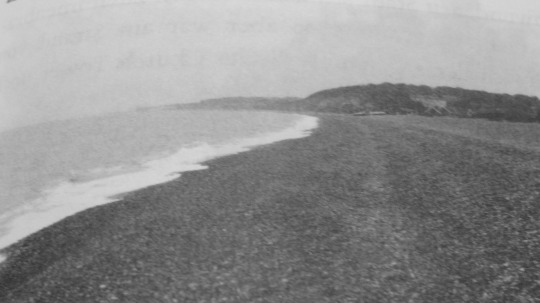
Sebald’s picture of Dunwich empty beach in Rings of Saturn
Or indeed, comic photography. For can we really believe, to take a random example, that Sebald’s photo (p.155 in the English version) of the North Sea at Dunwich, showing a dull unpeopled shingle beach devoid of interest or aesthetic quality, was chosen for any non-comic purpose? Dunwich, of course, was a godsend to Sebald’s general narrative of decay and transience; an example of a once-thriving port that has been destroyed and washed away by the forces of time, tide, storm and erosion. But the photo selected and inserted deliberately exaggerates and ironises the (in reality non-existent) contemporary boring-ness of the remaining hamlet.
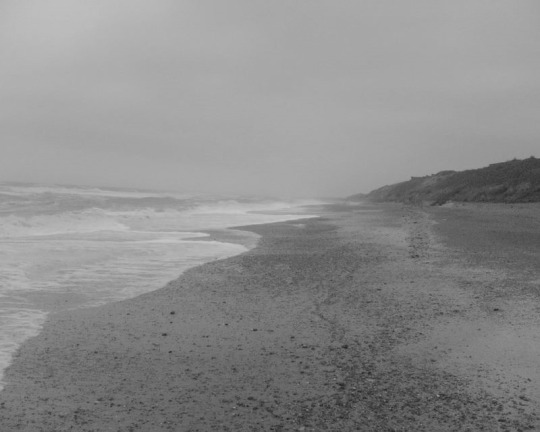
Author’s photo of empty Sizewell beach, from which one wife has been ‘disappeared’��
Now no one can accuse Sebald of not being mischievous (and misleading). On the very next page we find a picture of the “Eccles Church Tower” standing in the sand, just yards from the sea, which, he tells us, “still stood on Dunwich beach” until about 1890; moreover, “after Eccles Tower had also collapsed, the only Dunwich church that remained was the ruin of All Saints”.
I had never heard of Eccles Tower at Dunwich, but had assumed Sebald would not have made this up… but Sebald never claimed that he was writing pure documentary or accurate material. And he certainly wasn’t in accurate mode on this occasion. The Eccles Tower was so named because… it was never in Dunwich but in Eccles-by-the-Sea, 50 miles away on the north-east coast of Sebald’s own home county of Norfolk! The village and church of Eccles did however suffer a similar fate to Dunwich in that, over centuries, it was washed into the sea. (I learnt all this from a blog by Homo Ludens dated October 2007, though it is written about in more ‘literary’ reviews).

It is inconceivable that Sebald was confused or negligent about the Eccles Tower; since the facts are easily ascertainable by anyone truly interested, he can surely not have been hoping to deceive yet avoid discovery, nor does the insertion add any obvious narrative or other advantage (save maybe to underlines the unreliability of both the narrator and of memory in general). It seems to me that this is one of many examples of Sebald simply teasing his readers with games, amid his many horrific themes, setting them puzzles if they wish to delve further.
I am sadder (but wiser) to learn that there is no evidence that the train on the branch line from Halesworth to Walberswick was ever in the service of the Chinese Emperor in Beijing, as is proposed by Sebald.
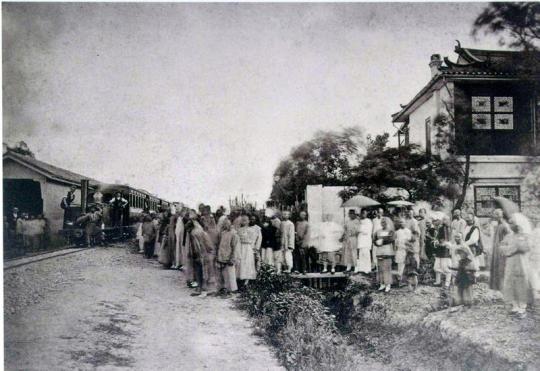
Photo https://en.wikipedia.org/wiki/History_of_rail_transport_in_China#/media/File:OpeningDay.jpg
It is a ‘truth’ that all readers surely yearn to believe, and the link is a literary necessity for Sebald to slide into the tale of imperialist interventions in China in the mid 19th century. Yet the fact that this tale of the Chinese train is pure invention is plain to see, once we realise that Sebald mixes playful post-truth with his more serious intent to recall past sufferings that humans have imposed on each other. He lures us into his false linkage as follows:
“According to local historians, the train that ran on [the branch line] had originally been built for the Emperor of China. Precisely which emperor had given this commission I have not succeeded in finding out, despite lengthy research; nor have I been able to discover why the order was never delivered or why this diminutive imperial train, which may have been intended to connect the Palace in Peking, then still surrounded by pinewoods, to one of the summer residences, ended up in service on a branch line of the Great Eastern Railway. The only thing the uncertain sources agree on is that the outlines of the imperial heraldic dragon, complete with a tail and somewhat clouded over by its own breath, could clearly be made out beneath the black paintwork of the carriages, which were used mainly by seaside holidaymakers and travelled at a maximum speed of sixteen miles per hour.”

http://thelostbyway.com/2013/09/w-g-sebalds-southwold.html
In retrospect, I cannot but admire and smile at the references to unnamed “local historians”, to the author’s “lengthy research” - which, alas!, does not help him succeed in finding out more - and to the unspecified “uncertain sources”.
Over the years, I have read many articles and exchanges about Sebald’s writing, but very few comment on the comedic dimension of his work, and those who do sometimes seem uncertain whether the effect is comic despite the author’s intention, or because he was, in the end, an implicitly witty writer, alongside his other qualities.
In her Introduction to “The Emergence of Memory: Conversations with W.G Sebald”, the American writer Lynne Sharon Schwartz emphasizes
“His dreamlike narratives, meandering yet meticulous, echo the lingering state of shock that is our legacy – not only from the wars of recent memory but from the centuries of colonialism that preceded them, indeed, history’s ‘long account of calamities’”.
But she adds,
“In the Rings of Saturn, to my mind Sebald’s best work, his imagination is given free rein and his digressive bent carried to its most extreme – almost comic – reaches. The swirling paths of thought cast a spell: if the reader is willing to submit, the author’s sensibility will carry him toward ever more tangled and distressing tales of decay, entropy, and destruction.” (My emphasis).
In a brief survey of the various authors’ contributions to her book, Schwartz notes that
“[Tim] Parks, incidentally, is the only writer to mention Sebald’s humor, which glimmers slyly through his pessimism and is often overlooked.”
And Parks himself refers to Sebald’s “accustomed blend of slyness and grim comedy” and describes how
“All too soon, however, and this is one of the most effective elements of comedy in Sebald’s work, the concrete will become elusive; the narrative momentum is dispersed in a delta as impenetrable as it is fertile.”
For me, and seemingly also for Parks, it is certain that Sebald knowingly wove comedy into his darker narrative meanders; and I am equally confident that many (though not necessarily all) of his factual errors (like the Eccles Tower) were likewise deliberately placed, either as a means of sliding the narrative apparently seamlessly in the direction he wanted next to explore, or simply as a game played with the reader.
Others are less sure whether the use of comedy and the falsified “facts” were deliberate. Michael Hutchins, in his contribution on Sebald in another collection of essays, “Authentisches Erzählen: Produktion, Narration, Rezeption”, claims that
“It often remains unclear whether Sebald’s faulty statements represent “learned jokes” or the work of a dyslexic scholar.”
And even the late Jenny Diski seemed uncertain about his comedic intent (or lack thereof). In an article in 2000 for the London Review of Books, she says:
“After a while this super-sensitised melancholy becomes comic. One’s patience is tried as it is with those tormented heroes of Dostoevsky, if you read them after adolescence. For God’s sake, Raskolnikov, get a hold on yourself, pull yourself together. Sebald’s narrator is for all the world a middle-aged existential wanderer, out of place, out of time, and wallowing in every miserable moment, sizing himself up against other grim, unhappy wanderers: Casanova in prison, Stendhal hopelessly besotted, Kafka tormented about his longings and terror of love in a clinic in Riva. There is comedy in the grim solemnity and it may well not be accidental, because, after all, if life is not appalling, it is absurd.” (My emphasis).
In his book “Understanding W.G.Sebald”, Mark Richard McCulloh sees the frequently satirical elements in Sebald’s writing, and clearly views this as intended by the author:
“The overriding mood many perceive in Sebald’s work is still the melancholy, the mournful, the autumnal. If one examines Sebald’s corpus as a whole, however, it becomes apparent that similar appellatives such as “melancholy” and “somber”…are simply too sweeping. There are satirical elements that emerge in his prose, products of his humor and astute powers of observation..”
Sebald has many critics who perceive only the dark side, and none of the humour which I consider to be the natural counterweight to his pessimism. Alas, Alan Bennett is one who only sees Sebald hoving to the darkly depressive side:
“Sebald seems to stage manage both the landscape and the weather to suit his (seldom cheerful) mood… ‘Never yet on my many visits […] have I found anyone about.’ The fact is, in Sebald nobody is ever about. This may be poetic but it seems to me a short-cut to significance.”
Whereas for me, the fact that for the narrator “nobody is ever about” is itself a reflection of the twinkle in Sebald’s authorial eye.
Michael Hofmann likewise fails to see much (well, in fact anything) positive in Sebald. In an article in Prospect magazine in September 2001, entitled “Sebald’s fog”, he not only dismissed his writing as a whole, but pointedly refers to his lack of humo(u)r:
“But what was even stranger was that Sebald operated without any of the rigmarole or pleasantness of the novel. The complete absence of humor, charm, grace, touch is startling – as startling as the fact that books written without them could enjoy any sort of success in England…”
And horror of horrors, in her 2003 New York Times review of “On the Natural History of Destruction”, the literary critic Daphne Merkin (1) sees any humour displayed by Sebald as simply being in poor cultural taste:
Needless to say, the colorless, nomadic universe he inhabits, where the pizzerias are dreary and the hotels unwelcoming, offers few flashes of humor except of the most heavy-handed, ironic variety (the eponymous Jacques Austerlitz recalls ordering an ice cream that turned out to be ''a plasterlike substance tasting of potato starch and notable chiefly for the fact that even after more than an hour it did not melt'').
I think this wilfully misses the broader point that in Sebald, the humour is in fact intrinsic to the very relentlessness of his dystopian narrative. Those constantly dreary pizzerias or hotels never fail to make me smile, knowing their type all too well…
It is true that on occasions – though they are not frequent – Sebald unleashes an overt, darkly ironic polemic, directed against some unsuspecting icon of modern life, great or small. In the Rings of Saturn, his description of the once (but no longer) prosperous and fashionable coastal resort of Lowestoft attracts his most biting prose.
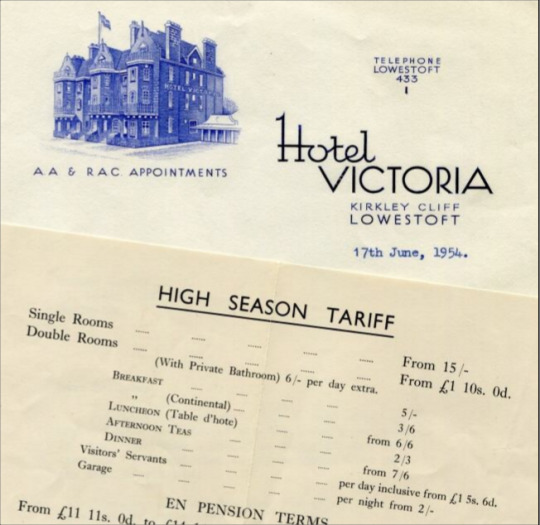
Victoria Hotel Lowestoft with 1954 price list - including for servants. Photo http://www.oldlowestoft.co.uk/?post_WW2...:Hotel_Victoria_1954
The particular victim is the Victoria Hotel (in the English version, it is called The Albion; could it be the publishers feared a libel suit?) which seems in reality to have been a rather genteel establishment, but this is Sebald’s take on it in the mid 1990s:
I stood for a good time in the empty lobby and wandered through the public rooms, which were completely deserted even now at the height of the season – if one can speak of a season in Lowestoft – before I happened upon a startled young woman who, after hunting pointlessly through the register on the reception desk, handed me a huge room key attached to a wooden pear…. That evening I was the sole guest in the huge dining room, and it was the same startled person who took my order and shortly afterwards brought me a fish that had doubtless lain entombed in the deep-freeze for years. The breadcrumb armour-plating of the fish had been partly singed by the grill, and the prongs of my fork bent on it. Indeed it was so difficult to penetrate what eventually proved to be nothing but an empty shell that my plate was a hideous mess once the operation was over. The tartare sauce that I had had to squeeze out of a plastic sachet was turned grey by the sooty breadcrumbs, and the fish itself, or what feigned to be fish, lay a sorry wreck among the grass-green peas and the remains of soggy chips that gleamed with fat.
(The German language original is even better in its display of contempt for the offering – no attempt here at subtlety!). (see footnote 2)
Or take Sebald’s diatribe against the (then) new Bibliothèque Nationale in Paris… For me, this is again comedic, though not in any way that risks causing laughter. It is its sheer relentless grumpiness that – as it progresses - induces a smile in the reader, at least in me. The attributed narrator of this passage, Austerlitz, as cited by the principal narrator (who gives us no name but while doubtless resembling is not necessarily identical to Sebald) searching for traces of his father lost (and almost certainly murdered in a death camp) in the war, takes time out in the book to express at some length his utter loathing of the new library. One feels that Sebald is here hardly bothering to maintain the thin dividing line between himself and the narrator(s) – that he is simply using the opportunity to express his own contempt for the Mitterandian pharaonic building and its Kafkaesque minders; we sense that Sebald himself must have been displaced from the much-loved old Bibliothèque nationale in the rue de Richelieu (which by coincidence is the very same street in which the Paris office of the Conseil des Communes et des Régions de l’Europe (CCRE) was situated when I was its Secretary General…)
“I do not think, said Austerlitz, that many of the old readers go to the new library on the Quai François Mauriac. In order to reach the Grande Bibliothèque you have to travel through a desolate no-man’s-land in one of those robot-driven Métro trains steered by a ghostly voice, or alternatively you have to catch a bus in the Place Valhubert and then walk along the windswept river bank towards the hideous, outsize building, the monumental dimensions of which were evidently inspired by the late President’s wish to perpetuate his memory whilst, perhaps because it had served this purpose, it was so conceived that it is, as I realized on my first visit, said Austerlitz, both in its outer appearance and inner constitution unwelcoming if not inimical to human beings, and runs counter, on principle, one might say, to the requirements of any true reader.”

Photo via https://ilovearchitecture.wordpress.com/page/2/
And so on and on, not releasing its prey for pages, nor pausing for paragraph breaks:
“When I first stood on the promenade deck of the new Bibliothèque Nationale, said Austerlitz, it took me a little while to find the place where the visitor is carried down on a conveyor belt to what appears to be a basement storey but, in reality, is the ground floor. This downwards journey, when you have just laboriously ascended to the plateau, struck me as an absolute absurdity, something that must have been devised – I can think of no other explanation, said Austerlitz – on purpose to instil a sense of insecurity and humiliation in the poor readers, especially as it ends in front of a sliding door of makeshift appearance which had a chain across it on the day of my first visit, and where you have to let yourself be searched by semi-uniformed security men. The floor of the large hall which you then enter is laid with rust-red carpet, on which a few low seats are placed far apart… And of course, Austerlitz continued, you cannot leave the red Sinai hall for the inner citadel of the library without more ado; first you have to put your request at an information point staffed by half a dozen ladies, whereupon, if this request to any degree exceeds the very simplest contingency, you take a number, like a visitor to a tax office; you then have to wait, often for half an hour or more, until another member of staff calls you into a separate cubicle, as if you were on business of an extremely dubious nature, or at least had to be dealt with away from the public gaze, and here you must say again what it is you have come for and receive the relevant instructions.”
Even quoting these passages at some length fails to give their real feel, since it is precisely their being embedded in the constant unending flow of thoughts and prose that gives (for me) the clear feeling that Sebald is having a kind of malicious fun, a verbal revenge on those who created and now control the new fortress-library and jealously guarded and restricted access to its store of knowledge. And yet the humour is always embedded in the most serious; the overt purpose of Austerlitz’s research is his quest for a father lost to him, but who was no doubt destined – with assistance from the French authorities - for the Nazi death camp. Thus the comedy, which undoubtedly infuses his prose, is dark indeed.
For my final example of Sebald’s humour, I turn to Vertigo. Now, Vertigo – like the Rings of Saturn and Austerlitz - can hardly be deemed light relief; to cite Jenny Diski’s LRB review again
“Sebald’s vertigo is caused by the centrifugal force of uncertainty that pervades everything, including our consolations.”
Nothing evidently humorous there; yet as she later says, “After a while this super-sensitised melancholy becomes comic.” Her problem, as I have cited above, is that she is not clear whether the intent was humorous, or merely the effect. But, to take an example from Vertigo (p.103) cited by Tim Parks, can one really doubt that Sebald was quietly joking when he describes the narrator’s reaction to the sight of a beautiful nun and girl in a railway compartment?
“Opposite me sat a Franciscan nun of about thirty or thirty-five and a young girl with a colourful patchwork jacket over her shoulders….The nun was reading her breviary and the girl, no less immersed, was reading a photo story. Both were consummately beautiful, both very much present yet altogether elsewhere… I admired the profound seriousness with which each of them turned the pages. Now the Franciscan nun would turn a page over, now the girl in the colourful jacket, then the girl again and then the Franciscan nun once more. Thus the time passed without my ever being able to exchange a glance with either the one or the other. I therefore tried to practice a like modesty, and took out Der Beredte Italiener, [“the eloquent Italian”] a handbook published in 1878 in Berne, for all who wish to make speedy and assured progress in colloquial Latin.”
The Eloquent Italian! Yet Parks can only - rather comment,
“Only Sebald, one suspects, would study an out-of-date phrase book while missing the chance to speak to two attractive ladies.”
A page of the alleged phrase-book’s translation is offered us in a picture adjoining this text, with a few words or phrases underlined by someone… in English, these would be ‘all saints’, ‘Carnival’, ‘angel’, ‘sin’, ‘fear’, ‘truth’, ‘lie’ and ‘pain’…
The two females, as the train approaches Milan Central Station, insert bookmark or green ribbon into their respective tomes, and when it arrives “disappear”, leaving the narrator standing on the platform claiming a sense of having been abandoned but still able to pose ludicrously grandiose and meaningless questions, and to generalise from his own momentary attraction to the duo, to the generalised human yearning to copulate and populate:
“What connection could there be, I then wondered and now wonder again, between those two beautiful female readers and this immense railway terminus which, when it was built in 1932, outdid all other railway stations in Europe; and what relation was there between the so-called monuments of the past and the vague longing, propagated through our bodies, to people the dust-blown expanses and tidal plains of the future.”

Photo of Milano Central Station via https://commons.wikimedia.org/wiki/File:Skateboarding_at_Central_Station,_Milan.jpg
Here, Sebald has descended into surely conscious self-parody – the questions are meaningless, as he knows, and no answer is given. All the narrator does is stroll down the platform, and buy himself a map of the city. A city map which contained on its front, we are told, an image of a labyrinth, and on its back a claim to be “Una guida sicura per l’organizzazione del vostro lavoro” - “A secure guide for the organisation of your work”.
I cannot finish without citing one eminent source that supports my own view of Sebald:
“[His books] are notable for their curious and wide-ranging mixture of fact (or apparent fact), recollection and fiction, often punctuated by indistinct black-and-white photographs set in evocative counterpoint to the narrative rather than illustrating it directly. His novels are presented as observations and recollections made while travelling around Europe. They also have a dry and mischievous sense of humour.”
The eminent source is of course none other than Wikipedia – and against the last sentence we find the following addition: “citation needed”. Well, here I am.
Postscript
In reading quite a lot of articles about Sebald and his use (or non-use, or abuse) of humour I was happy – since my blog is named “Refractions”, to find two comments that refer to the Sebald as having a “refracted” view of the world:
“Sebald’s refracted and sometimes alienated views of both his native Germany and his adopted English homeland have had astonishing resonance in the German- and English-speaking worlds.”
Note on Amazon.co.uk page to W. G. Sebald - A Critical Companion (Literary Conjugations) Paperback – 1 Jul 2004
I was immediately hypnotised by the curious prose style, so flat and ostensibly inconsequential, which describes a kind of meditative interior monologue, not at all the world as it is seen and described by an ordinary person, but a view of the world seen through a glass darkly and refracted through the strange and sometimes uncomfortable imagination of a dyspeptic and exceptionally knowledgeable, middle-aged professor of German literature, whom one presumes has never been married and who decides to take a long and entirely purposeless walk round the shores of East Anglia meditating on aspects of its history and what he sees en route.
Charles Saumarez Smith Review of Austerlitz, The Observer 30 September 2001
Footnotes
(1) I know almost nothing about Ms Daphne Merkin but her review leaves me with a very, very dim view of her sense or sensibility - she says this in the same essay:
Who else but a gloomy, deskbound intellectual would warm to a narrator who chooses as his ''favorite haunt'' the Sailors' Reading Room in Southwold, which is ''almost always deserted but for one or two of the surviving fishermen and seafarers sitting in silence in the armchairs, whiling the hours away''?
Speaking for fellow deskbound gloomsters (not sure about the intellectual bit) I can assure Ms Merkin that the Southwold Sailors’ Reading Room is a wonderful, peaceful place overlooking the sea, in one of England’s favourite (for the middle classes, at least) coastal resorts.
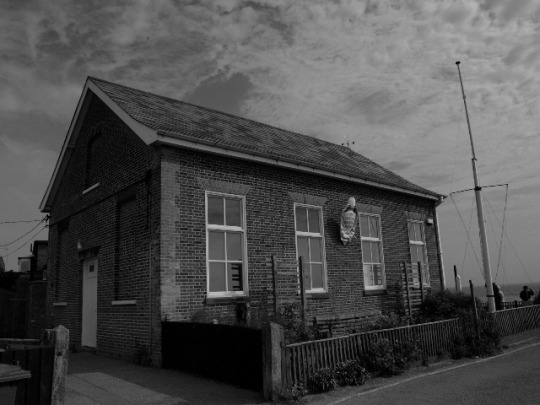
Photo of the Sailors’ Reading Room via http://www.geograph.org.uk/photo/2607778
(2) The German passage, concerning the delicious fish and chips:
Dieselbe verschreckte Person ist es auch gewesen, die später in dem großen Speisesaal, in dem ich an jenem Abend als einziger Gast saß, meine Bestellung entgegennham und die mir bald darauf einen gewiß seit Jahren schon in der Kühltruhe vergrabenen Fisch brachte, an dessen paniertem, vom Grill stellenweise versengten Panzer ich dann die Zinken meiner Gabel verborg. Tatsächlich machte es mir solche Mühe, ins Innere des, wie es sich schließlich zeigte, aus nichts als seiner harten Umwandung bestehenden Gegenstands vorzudringen, daß mein Teller nach dieser Operation einen furchtbaren Anblick bot. Die Sauce Tartare, die ich aus einem Plastiktütchen hatte herausquetschen müssen, war von der rußigen Semmelbröseln gräulich verfärbt, und der Fisch selber, oder das, was ihn vorstellen sollte, lag zur Hälfte zerstört unter den grasgrünen englischen Erbsen und den Überresten der fettig glänzenden Chips.
1 note
·
View note